Online launch in December 2021
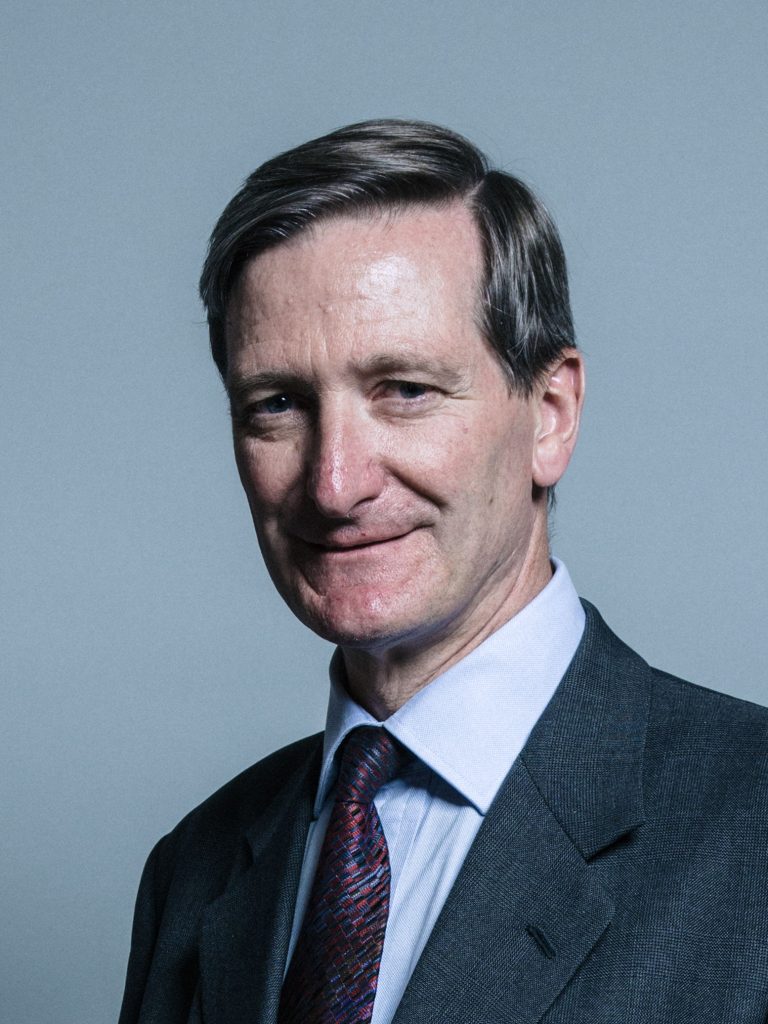
Dominic Grieve is a barrister and a visiting professor on Law, Politics and Human Rights at Goldsmiths, University of London. From 1997-2019 he was MP for Beaconsfield. He was Shadow Home Secretary from 2008-09 and Shadow Justice Secretary from 2008-10. He was Attorney General of England and Wales from 2010-14. From 2015-19 he was chair of the Intelligence and Security Committee of Parliament.
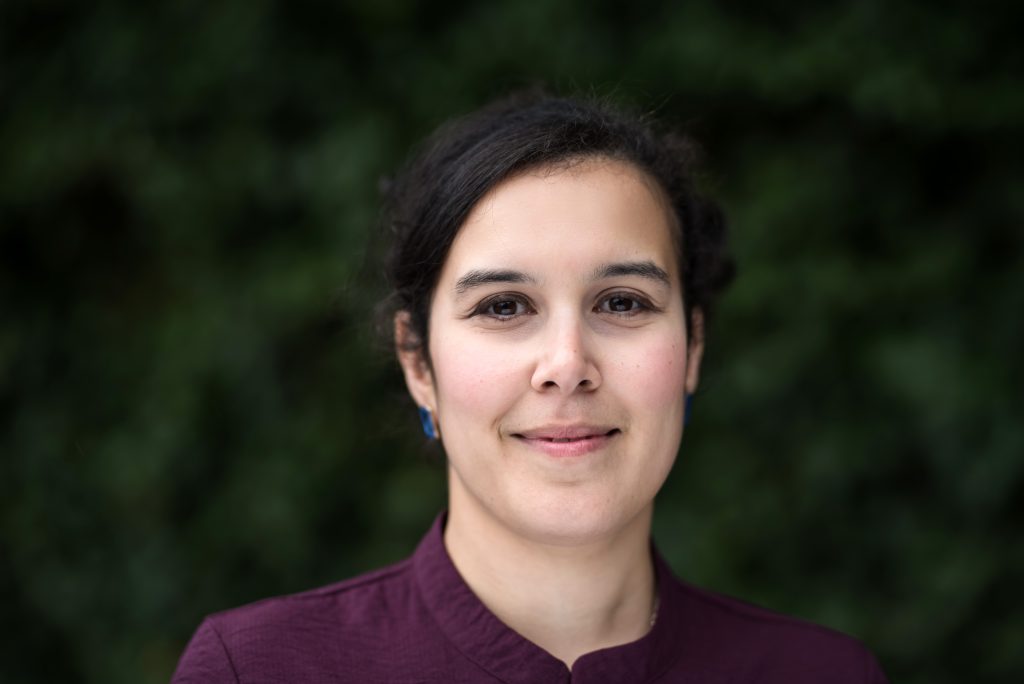
Nada Kiswanson is a Swedish lawyer of Palestinian origin. She serves as counsel for hundreds of Palestinian victims before the International Criminal Court. Kiswanson has worked on the occupation of Palestine for over a decade, for and alongside human rights organisations. During that time she has explored numerous justice and accountability mechanisms for violations committed in Palestine.

Hagit Ofran works at the “Settlement Watch” project at the Israeli peace movement of “Peace Now”. Widely-recognised as one of Israel’s foremost experts on a full range of issues related to West Bank settlements and settlement-related developments in East Jerusalem, Hagit’s work includes traveling daily throughout the West Bank, examining aerial photos and browsing official Israeli documents. The “Settlement Watch” project serves as a resource for Israeli politicians, diplomats, international media organizations, and first and foremost – for the Israeli public.
Dominic Grieve QC:
Good afternoon and welcome to this webinar, which has been prepared in order to launch the booklet that was produced as a consequence of the May 2021 Balfour Project conference on the Rule of Law in Israel/Palestine. I’m Dominic Grieve and I participated and chaired the first session of that conference. And this afternoon, it’s my privilege and pleasure to introduce two other speakers and to say a few words of my own about the booklet that we have produced and about some of the underlying issues. At the root of the Balfour Project is the view by those of us in this country, and the people who are associated with the Project, of Britain’s key role – its historic role and its role today – in the creation of Israel and as a consequence of the Palestinian issue that has arisen from it.
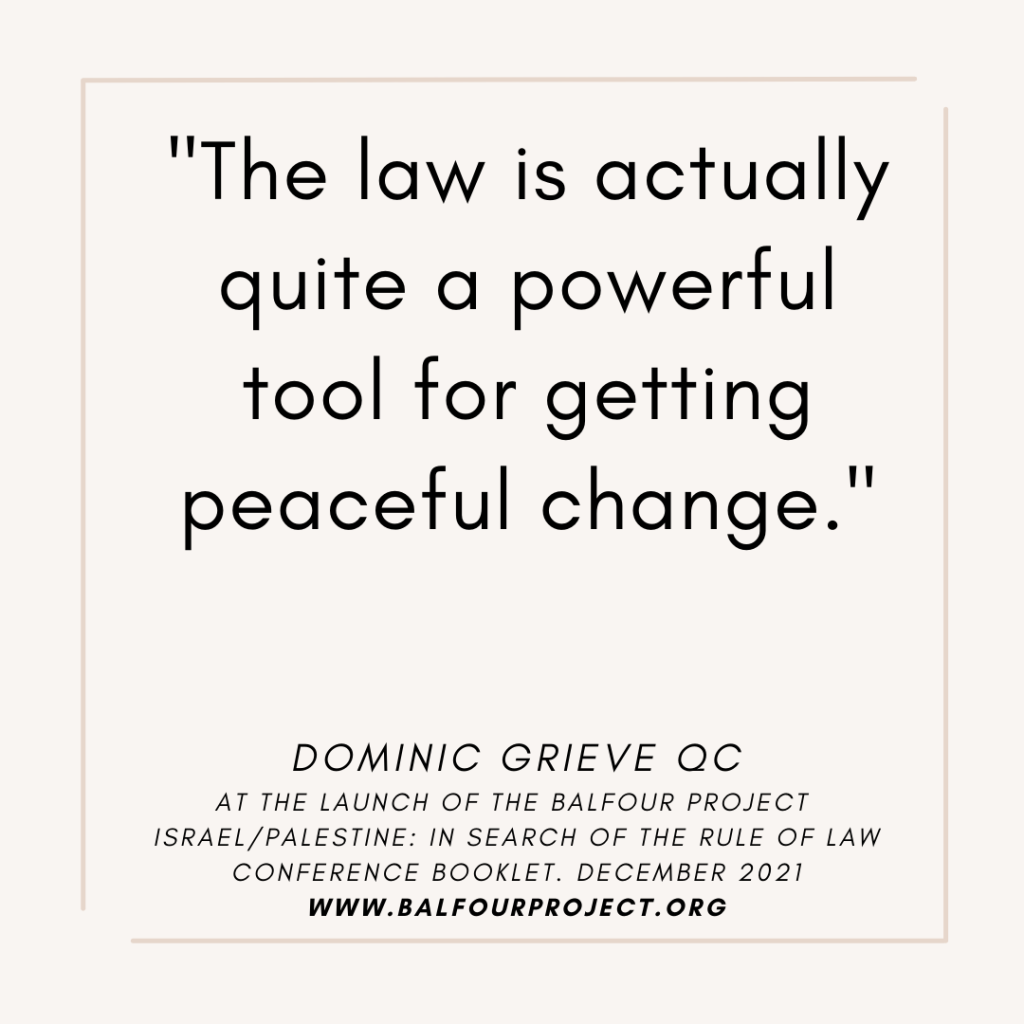
We are believers in the right of the Israeli state to exist. And indeed, in wishing to have the friendliest possible relations with Israel that has always shown itself in many aspects to be a very good friend of the United Kingdom and indeed to claim to embody democratic principles and embrace the rule of law.
But the hard truth is that in the context of both Palestinian Territories in the West Bank, and also in Gaza, Israel is falling far short of its international legal obligations, and indeed is acting in ways which undermine its own status as a rule of law state.
No one who has traveled to the West Bank can fail to see the extent to which Israel’s security needs – as it would call it in order to justify its actions – are in fact, carving up the territory which is inhabited legally and legitimately by the Palestinian People. This is creating a series of enclaves and in consequence is making the prospect of the creation of a two-state solution to the Israel/Palestine question impossible.
And that should be of concern to all of us who wish to see the rule of law succeed in Israel as much as within the West Bank and Gaza. Unless this is addressed, the reality is that Israel is heading towards becoming an apartheid state, controlling the entirety of the old Palestinian mandate territory but granting to many of the people living within it completely different sets of rights from those that are enjoyed by Israeli citizens in Israel itself. And indeed, the issue is even more complex than that, because depending on where you may be, the rights that you are likely to enjoy will differ from one place to another.
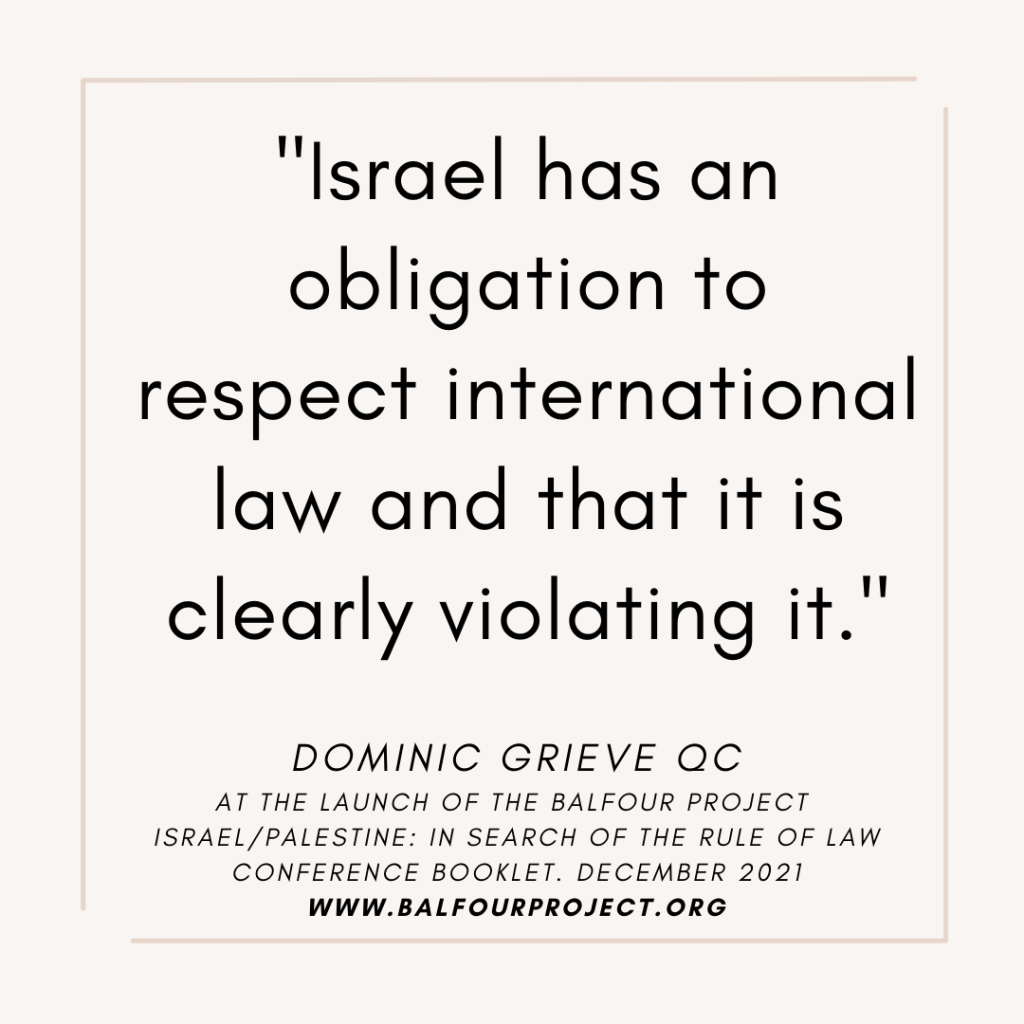
That then was what our conference set out to look at. And we were immensely fortunate in having a wide range of speakers. We began with Baroness Hale, who explained why the rule of law matters, looking at recent developments in Israel and Palestine. She was followed by Philippe Sands QC who set out his views. We then looked at what was actually happening on the ground in the second day of the conference, with contributions about the settlement projects, the reality of Palestinian children in Israeli military detention, what was happening in Gaza and the issues of accountability. The conference ended with a discussion between leading political figures in the United Kingdom about whether we can help make international law prevail in Israel/Palestine, and whether there’s a contribution that we can make based on some of our own experiences – for example, in Northern Ireland – which might help bring the two sides together and achieve a lasting settlement.
As I commented in the course of the conference, and I think it was also commented on by others, one of the problems is that no one appears to be optimistic about any route ahead. This encourages both sclerosis and slide with nothing happening to improve matters, and a tendency incrementally for matters to get worse.
Those were the issues that we wanted to look at. I hope that the booklet, which has only just gone up on the website, makes a positive contribution to that discussion and will be a good read for those of you who are coming this afternoon.
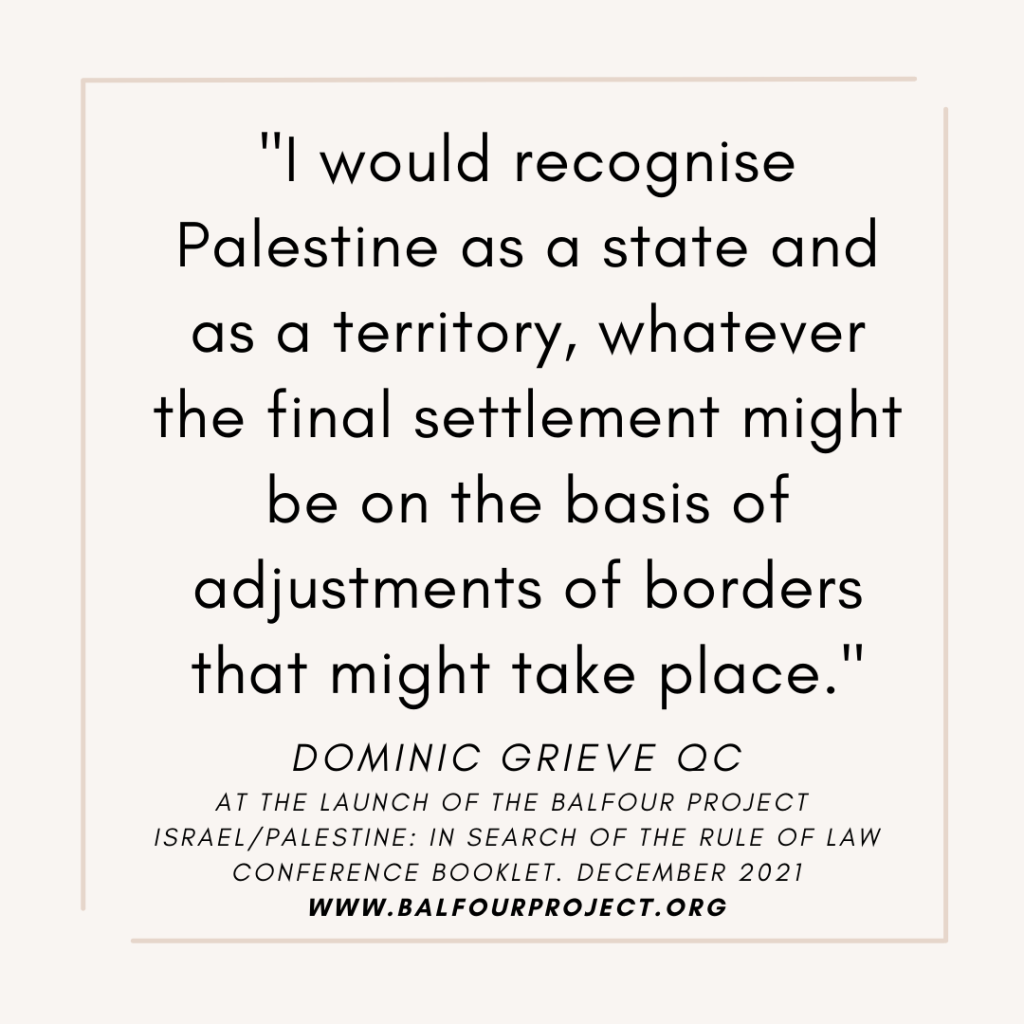
But I have no pretence to be an expert on this subject, fascinated as I’ve been by my visits to Israel and Palestine over my time in government and shortly beforehand, when I was a member of parliament.
But what we do have today are two speakers, Hagit Ofran and Nada Kiswanson, who are going to make contributions of their own after which we can have a conversation and discussion bringing in all of you who have joined us this afternoon.
So, thank you very much for joining us this afternoon. And without any more ado, I am going to pass over to Hagit who will do her presentation to you. Thank you.
Hagit Ofran:
Thank you very much. I’m Hagit Ofran from PeaceNow and I’m Israeli – Jewish – active over many years trying to fight the occupation, and especially the settlements. And I would like to try in 10 minutes to show an overview of current trends with regard to the settlements, and I hope not to be too depressing.
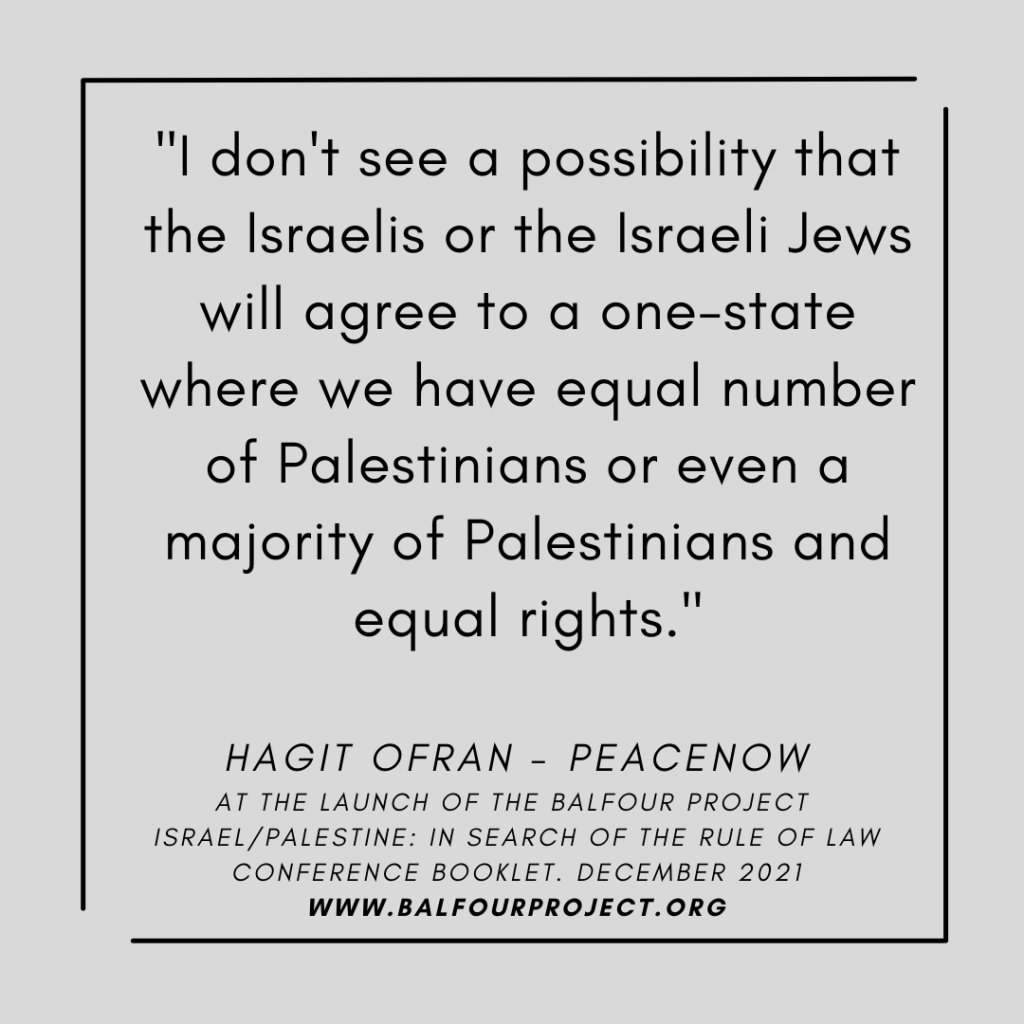
Usually when we talk about settlement activity, people tend to look at the numbers, want to know data, et cetera. So, I will just give you an example, in October the government approved plans for almost 3000 units in settlements and another 1300 units which are tenders, which are for the construction. And this is like a “normal number” of construction and development in settlements. And as you can see on the map, it’s all over the West Bank. It’s not concentrated specifically in one place. And this means Israel is deepening its hold on the occupied territories.
But I want us to remember that it’s not only a question of numbers. There are some places where construction is more dramatic in terms of the human rights of the people around it. For instance, if we look at this picture it is the very beginning of construction of 31 units in the heart of Hebron, the Palestinian city of Hebron. The new settlement being built right now has a tremendous effect on the people living in Hebron. When you look at settlements it’s not only about numbers.
Another important development, again, only from October, was the beginning of construction in the settlement of Ariel which, according to Israel, is a city 20 kilometers deep in the West Bank. And officially the new construction was supposed to be part of Ariel. But when we look at the location of it, it’s west of Ariel, and it’s actually two kilometers drive from the settlement, outside of the fenced area. So, you might say that in fact it is a new settlement that they are now starting to build in the West Bank in 2021. And it is totally cutting off the town of Salfit which was supposed to be the town that connects with all the northern villages around it. Now Salfit really has no potential for development. And that’s another important development.
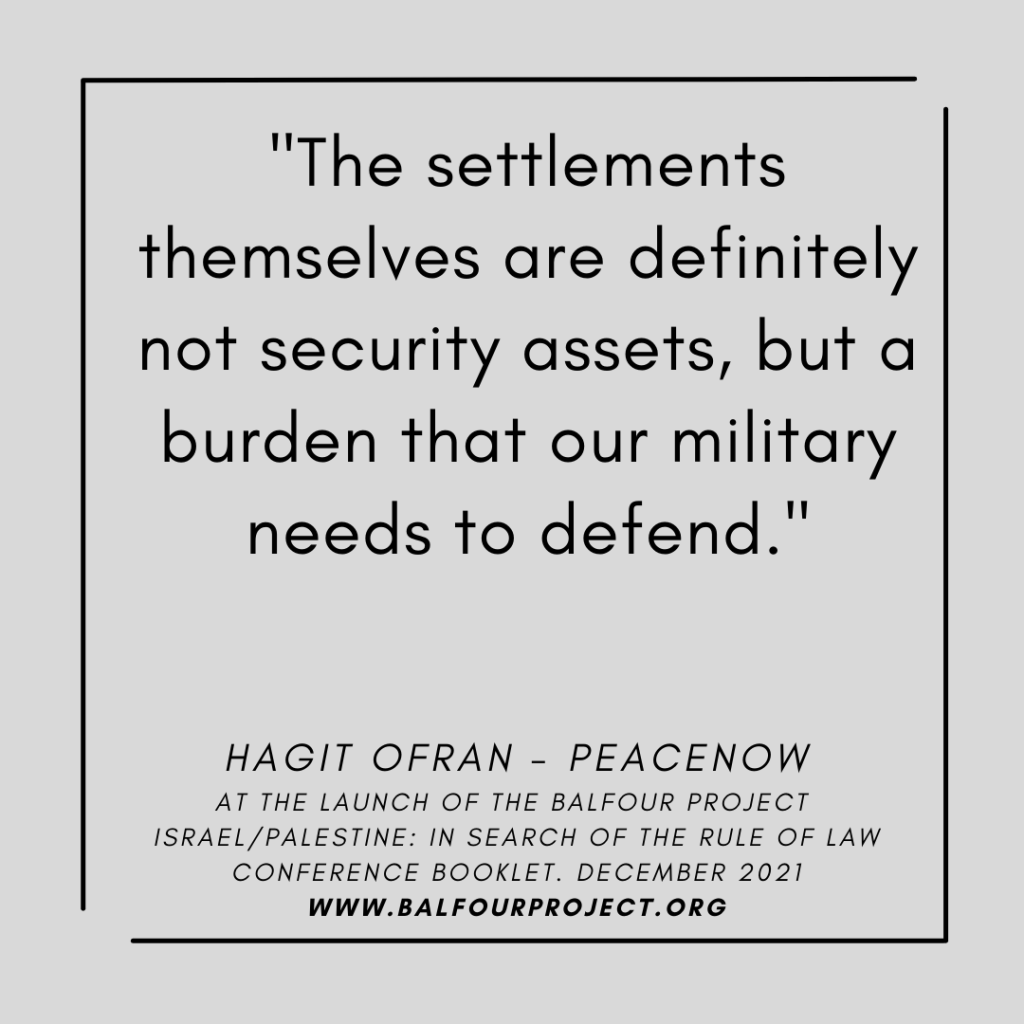
The most famous plan that was promoted but then stopped was the Atarot Plan, the Qalandia Plan. As you can see, I put here three big and important plans that are considered more traumatic or more lethal for the potential of establishment of a Palestinian state because they cut the continuity of very densely populated Palestinian areas. We’re talking about Atarot, north of Jerusalem, E1, east of Jerusalem and Givat Hamatos south of Jerusalem. And these three settlements are being promoted even in this new government that we have today.
And I want to say it’s considered lethal to a Palestinian state, meaning to a two-state solution, but it’s also lethal for the very development of any Palestinian economy or development, whether as a state or not as a state.
Another very important trend is the establishment of farm outposts, illegal settlements. Of course, all settlements are illegal, but even according to the Israeli laws we have many, almost 50 of them, that were established in the last four years. And it’s all scattered all around and when I’m saying it’s farms, it looks like that. It happens in a very small place with very few people. Sometimes it’s a young couple and three volunteers or something. They live in in an old truck or something to start with it, so that you cannot consider it as illegal construction, but soon after they will build other things illegally and they will bring their sheep and go around in the West Bank.
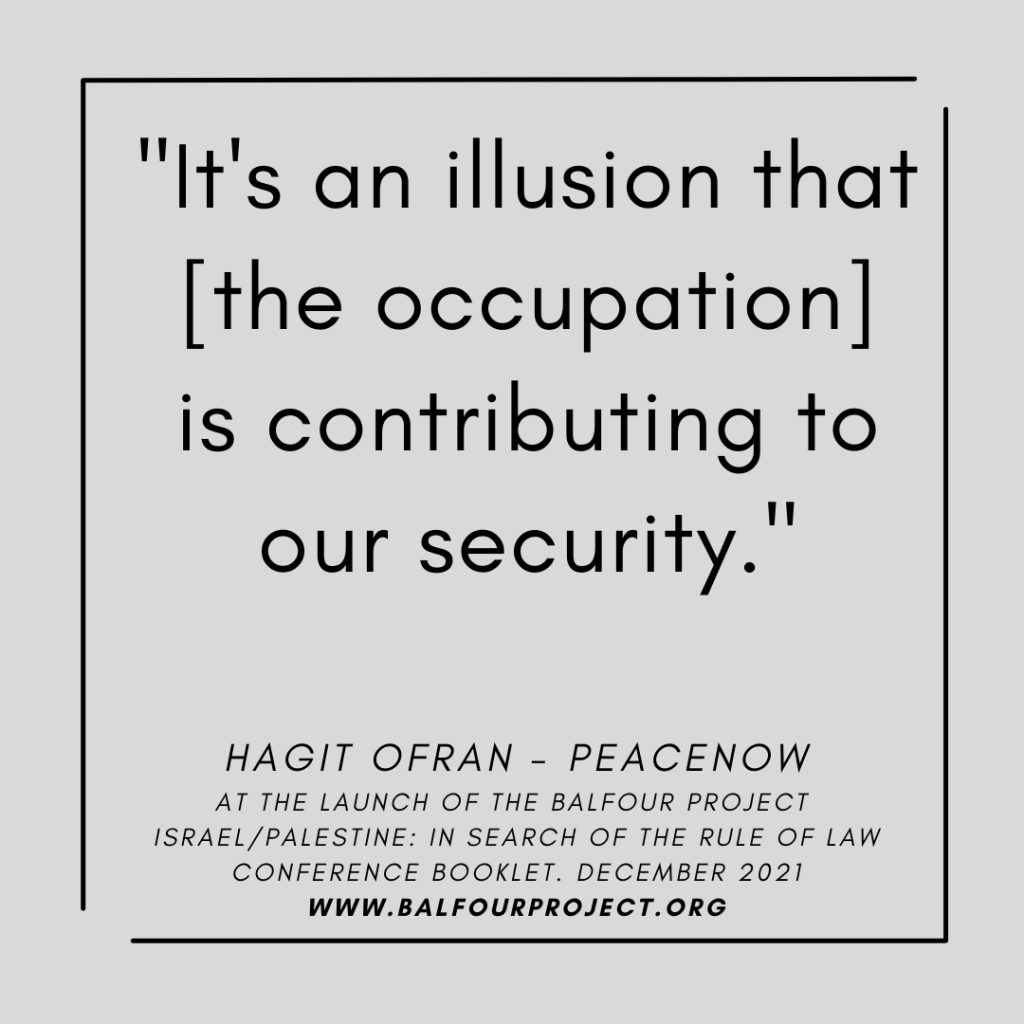
And what they see themselves doing is, they call it, protecting the nation’s land. The nation’s land is land that they consider, or the government of Israel considers, state land, it’s actually public land. And they see themselves as protecting the lands by kicking out the Palestinian presence from those lands. And they get documents from one of authorities that gives them a lot of land.
This is an example of a map of the land that one settler got. It’s almost 2000 dunams here, a little more. It’s in the south Hebron hills in this case. And this settler officially, or half officially, has the right to all these lands. So, what he does every morning is to go out to the field and kick out the Palestinians. The settlers do this in various ways. And it’s not by accident that we see a rise in the settlers’ violence, because they’re there to kick the Palestinians out. And sometimes they will do it politely and say, “go away” or they call the army to do it. And sometimes they will do it more violently, and friction is very high. And this is another very important trend to notice, the new settlements.
Another very dramatic change is the issue of roads. Many strategic roads are now under construction. And the roads are the key for the development of the settlements. Now for instance, south of Bethlehem, we have around 60,000 settlers and they commute every day to Jerusalem, it takes them one hour now because of the traffic jam. In a couple of years, this upgrade of the main road will be complete, and it’ll take them 10 minutes.
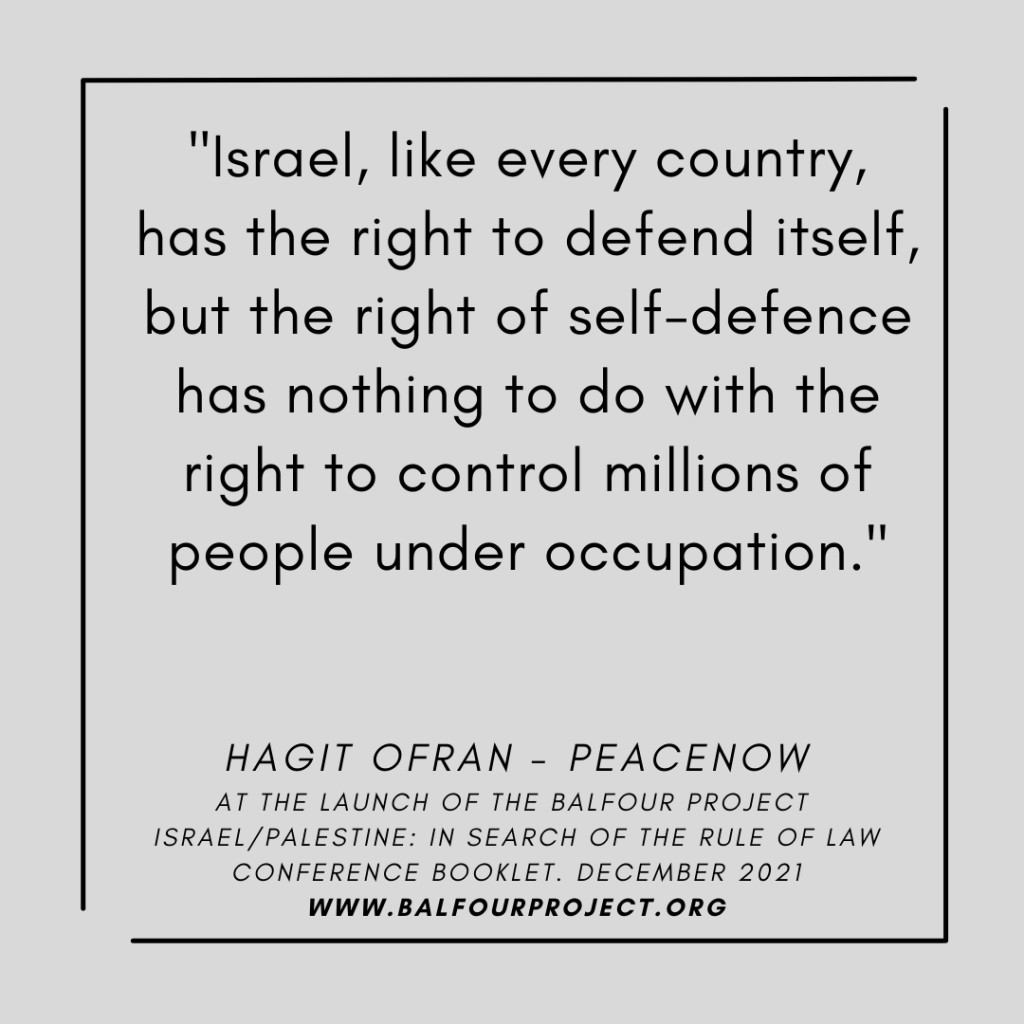
And if you have such a highway, the construction will follow immediately, and the settlements will be like suburbs of Jerusalem. And that’s what the government is trying to achieve, and this is very dramatic and it’s ongoing.
Another important thing. This is a picture of Palestinians from Batan al-Hawa in East Jerusalem. We have hundreds of Palestinians under threat of being evicted or displaced from their homes in Silwan. This picture is from Silwan and of course Sheikh Jarrah that you have all heard of, and it’s all done in the same mechanism, utilizing a discriminatory law. This allows the right of return for Jewish properties in East Jerusalem, but we have another law that does not allow the right of return of Palestinians to their properties in West Jerusalem and Israel.
And based on that we have eviction lawsuits against hundreds of Palestinians. We might get to a final ruling in the coming days, weeks or months – we don’t know exactly. Here is the Sheikh Jarrah map with all the red houses that are under threat of eviction, et cetera.
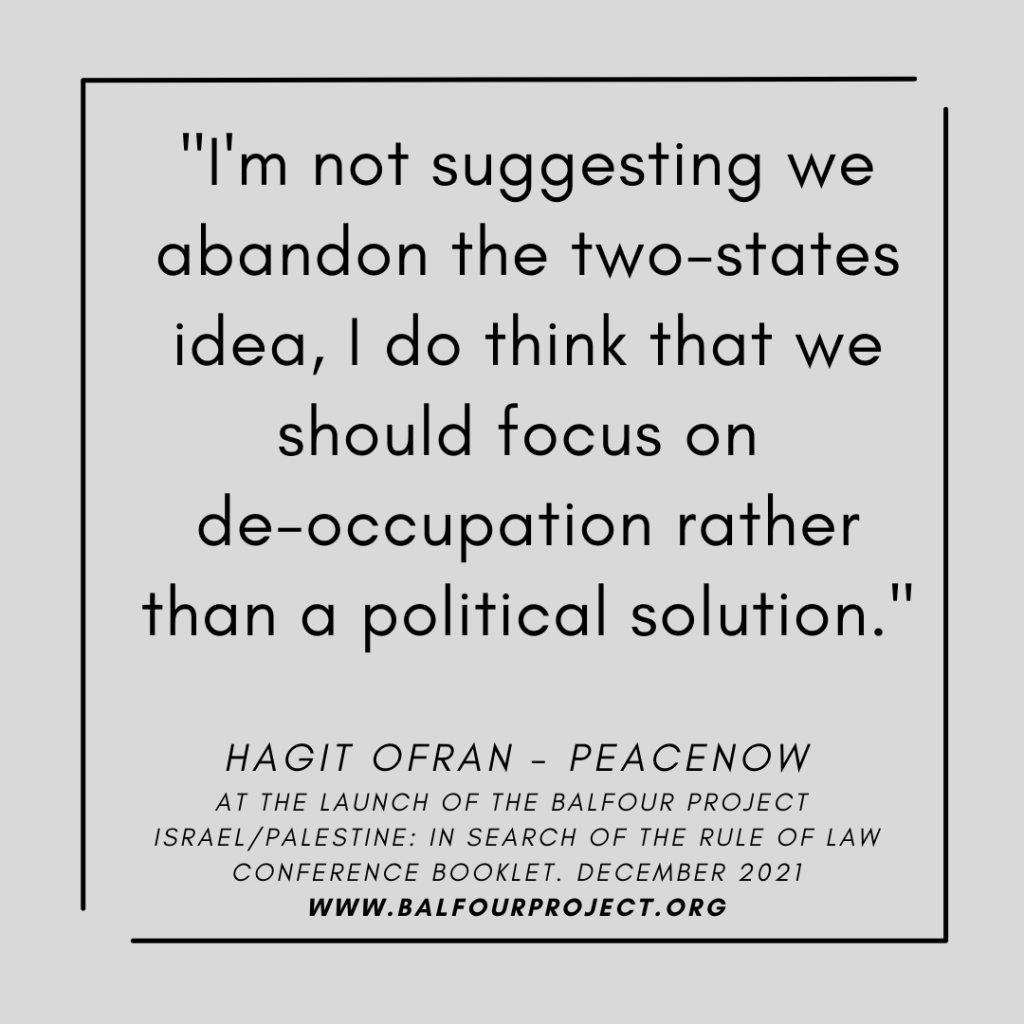
Now I want to conclude with the question of how to fight this. Many were talking about bringing the sides together to talk and to negotiate a solution. And when we get the final status agreement, then all the problems will be solved because Israel will withdraw from most of the West Bank. It will be a Palestinian state, and, in this way, we will solve the problem. And I totally support this. And I try to bring this about, the two-states. I don’t want to call it a solution, but the two-state reality, but at the same time, people have lost all their hope that such an agreement is possible.
And I think mostly it’s not that it’s not possible physically, but it is not possible politically to imagine that there is the leadership to do it, et cetera. So, I want to say that the approach that puts all the political efforts on bringing the sides together to talk, which was very strong under the Obama Administration, is not relevant when you don’t have any will or wish to negotiate.
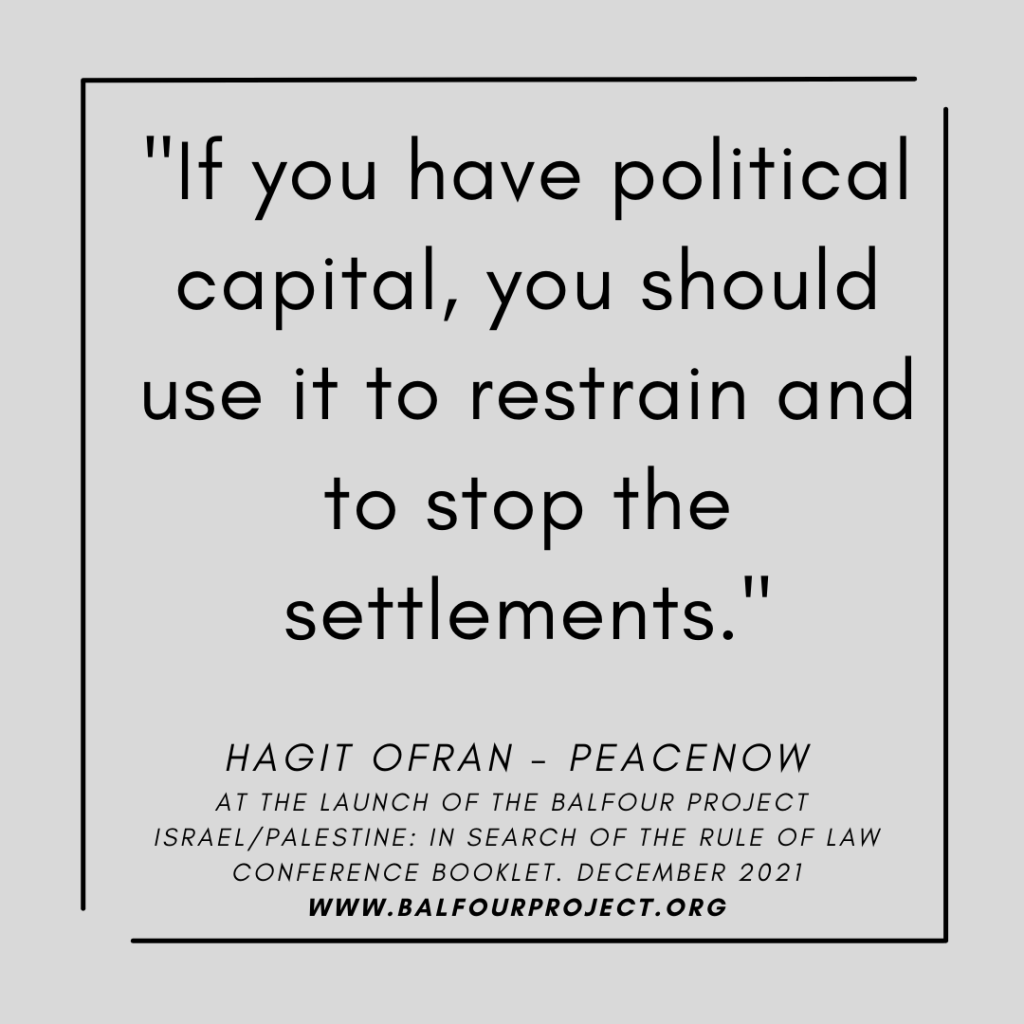
If you have political capital, you should use it to restrain and to stop the settlements and not to bring the sides together to talk. I think that’s a conclusion that we can easily learn from previous years. And also, we have new factors now, we have the investigation of the International Criminal Court, which could be a game changer. We have UN Security Council Resolution 2334, and other tools that are focused on stopping settlements and restraining them. And while I’m not suggesting we abandon the two-states idea, I do think that we should focus on de-occupation rather than a political solution.
Dominic:
Thank you very much Hagit for that presentation of how the process of settlement has been proceeding and carving and parceling up the West Bank. Nada, can I ask you to speak next?
Nada Kiswanson:
So, thank you so much for inviting me again to participate in an event with the Balfour Project and today’s launch of its booklet on the Rule of Law Conference. I dedicated my presentation last time to the topic of accountability and I want to revisit that subject here today.
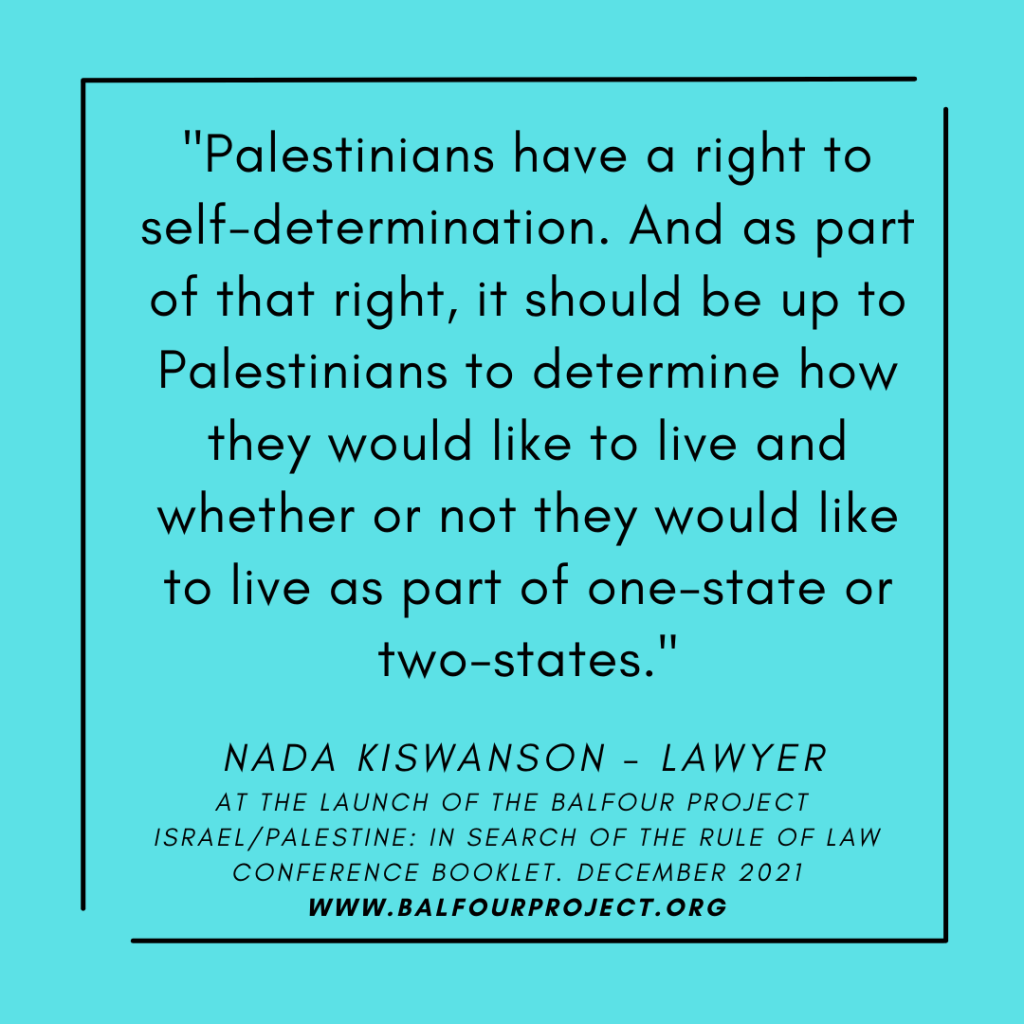
My area of expertise is international criminal law, and I like to believe that nobody would argue with the premise that persons that commit outrageous criminal acts should be punished. Citizens of law-abiding countries take for granted that when a crime is committed, they can turn to the police, file a complaint, participate in the investigation and have their day in court. We know far too well that this is not the case for Palestinians living under Israeli control and occupation. I therefore pressed during my first presentation on the need for external intervention by, for example, the International Criminal Court.
But accountability is really much more than that, it’s about preventing wrongdoing. It’s about creating a culture of responsibility and respect between human beings. It’s about ensuring humane governance and the rule of law. And there will be no accountability when persons are being treated unequally and when one racial group is considered divine and beyond reproach.
There is no accountability, I think it’s fair to say today after half a century of occupation, when it comes to Israel’s occupation of Palestine and its treatment of Palestinians, and nothing really should be allowed to justify unjust conduct.
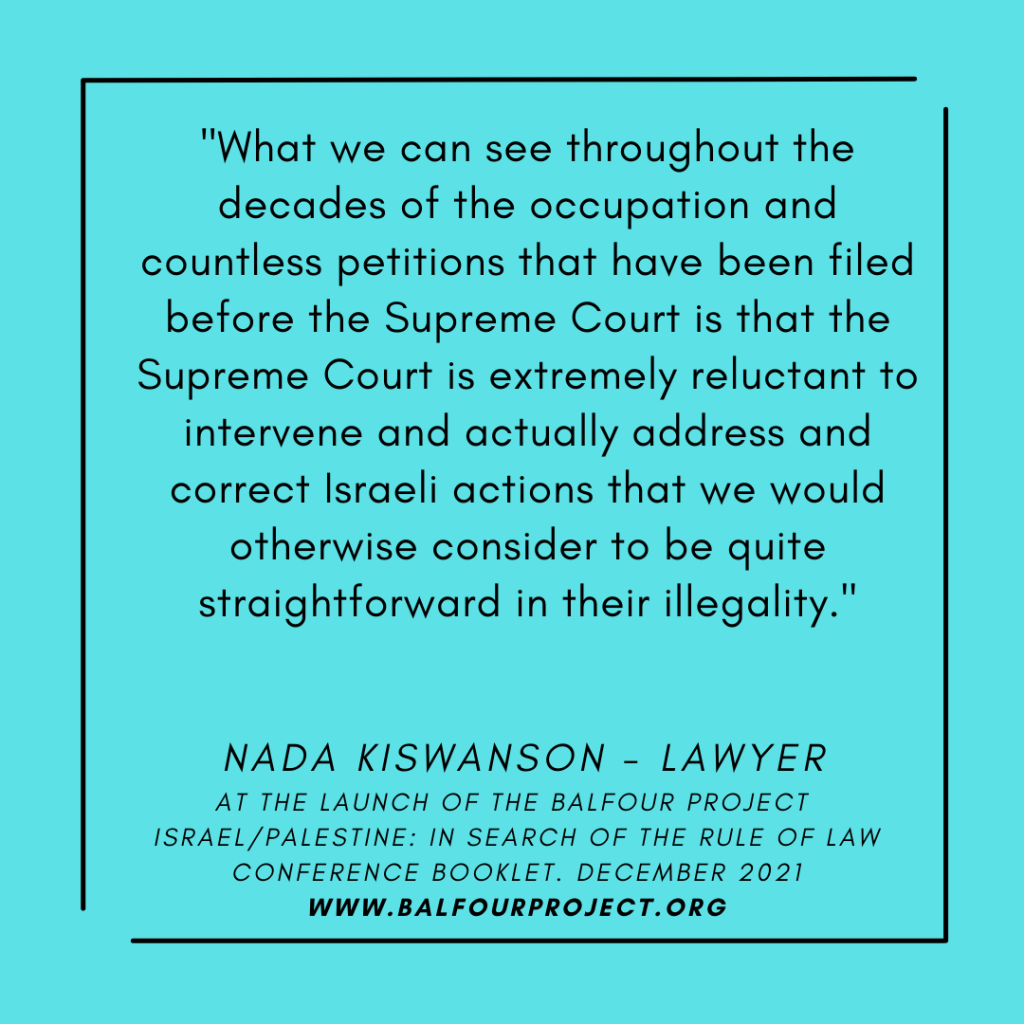
Now, because accountability poses a threat to those that profit from lawlessness and subjugation, human rights defenders and civil society organisations in Israel and Palestine have faced orchestrated opposition and suppression in Israel and Palestine for decades.
Since the Rule of Law Conference in May of this year, this suppression culminated in a decision by Israel to designate six Palestinian human rights organisations, including Al-Haq and Addameer, as unlawful organisations. This designation occurred under anti-terrorism legislation. And effectively what this could mean is that staff could be prosecuted and imprisoned. The assets of the organisations could be seized, and the organisations could ultimately be forced to shut down.
Shortly after this designation, Front Line Defenders, Citizen Lab, and Amnesty International’s Security Lab confirmed that the spyware Pegasus was present on the phones of six Palestinian human rights defenders. Three of these human rights defenders work at one of the six organizations that have been designated as unlawful.
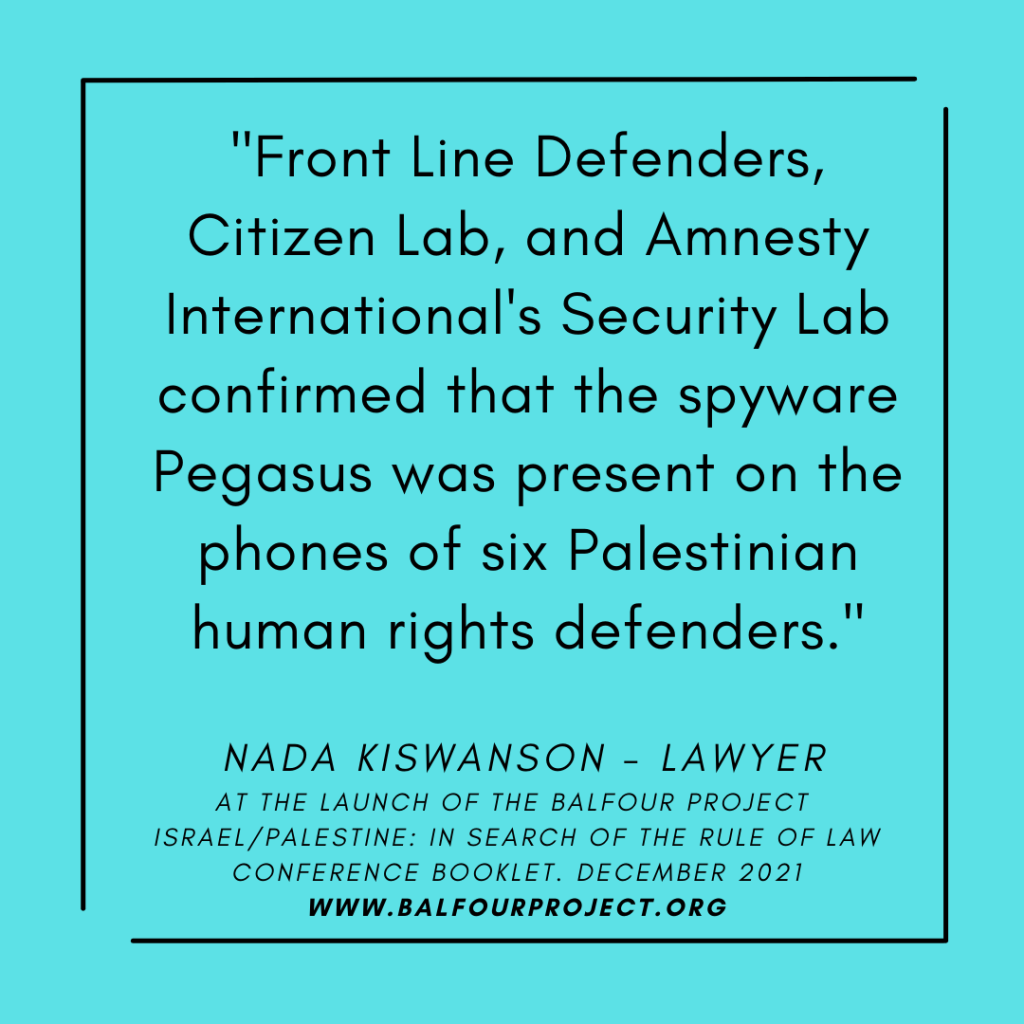
Now Pegasus is a product of the Israeli NSO Group. And since then, there’s been quite a lot of coverage about the NSO Group and the use of its spyware against human rights defenders around the globe, but also against politicians and royalty. Apple very recently sued the NSO Group, and I quote, to hold it accountable for cyber surveillance of its products.
By attempting to instill fear in the human rights community and silence those that dare speak up against occupation, Israel is betraying its own self promoted image of a civilised democratic country. But it’s also striking at the very heart of accountability because it is trying to silence those that try to achieve it.
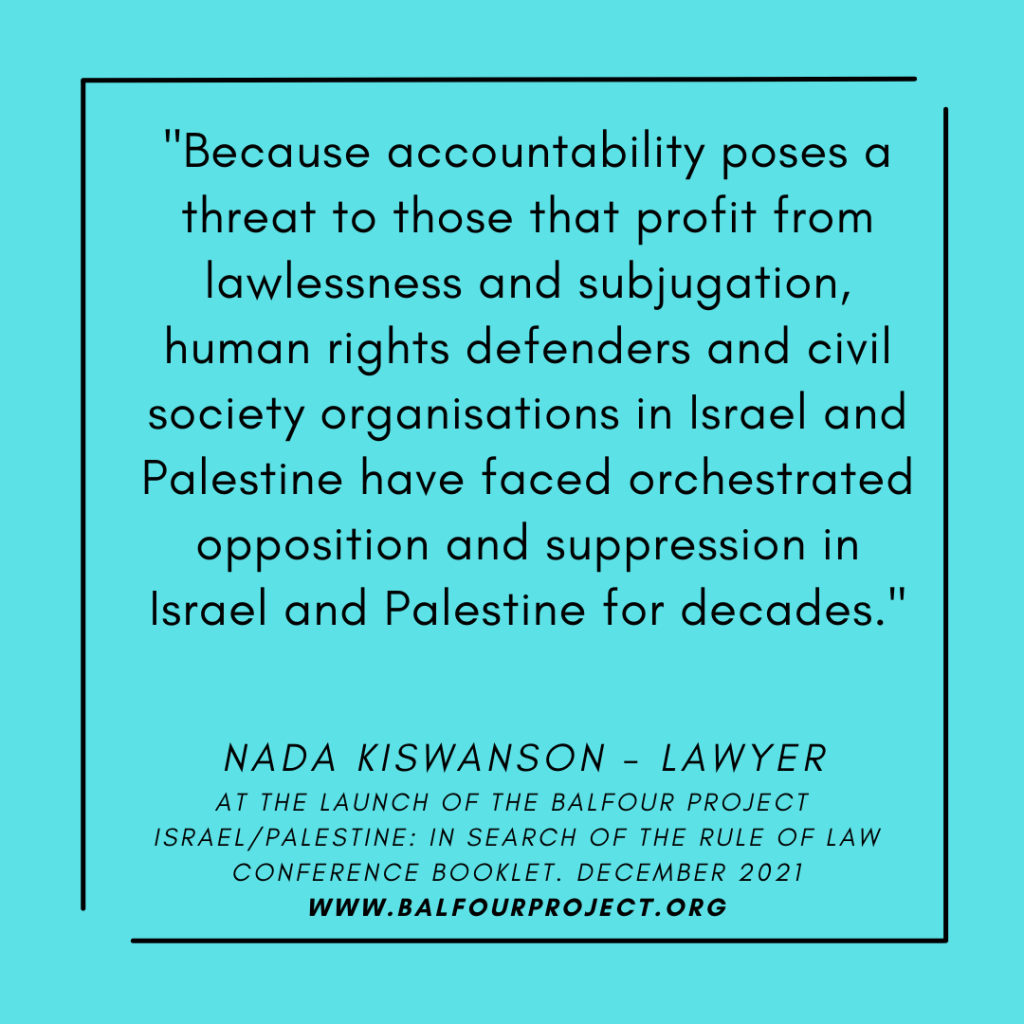
Now, the Balfour Project recognises the historic role and involvement of Britain in Palestine. But what I found powerful about the Rule of Law Conference was its focus on principle above all. It looked at the occupation through the lens of the law and placed it within the appropriate international legal framework.
I congratulate the Balfour Project on its conference, which I had the pleasure of speaking at, as well as its booklet that is launched today. Thank you very much for inviting me to speak at again.
John McHugo:
Thank you very much, Nada. And thank you to all our panelists. My name is John McHugo. I’m a trustee of the Balfour Project and I was one of the trustees who were involved in organising the conference. And we’re very grateful to our three speakers today. Dominic Grieve, Hagit Ofran and Nada Kiswanson for helping us to launch this document.
The souvenir brochure of the conference went live at three o’clock this afternoon online. You can already download it if you would like to.
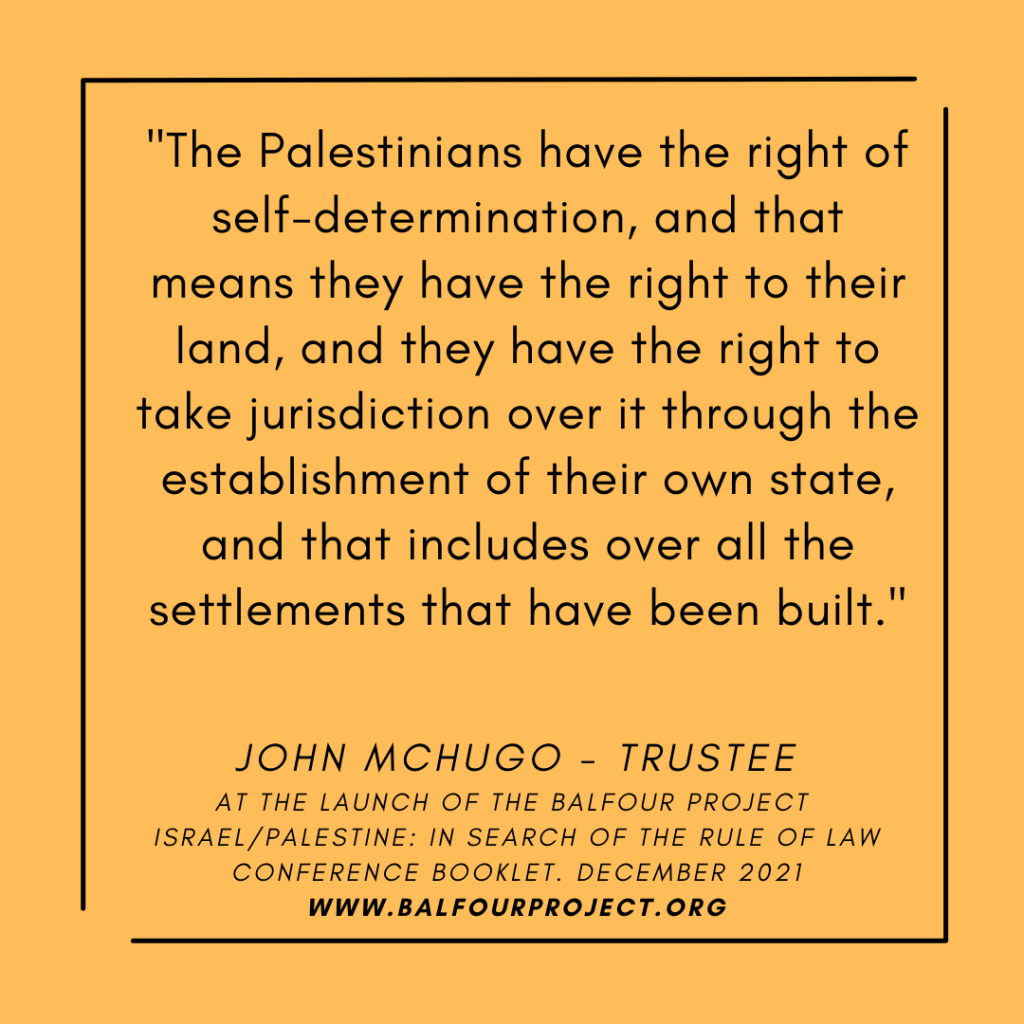
Our speakers have kindly agreed to stay for a little longer in case you have any questions. And I have got several that I would like to pass on from the chat box that have come in while they’ve been speaking.
But before I do that, maybe I could make a couple of comments myself. You know about the Balfour Project mission statement. It is there on our website if you want to remind yourself of it. This conference also ended with a concluding statement that appropriately enough is printed right at the beginning of the souvenir brochure. If you would like a printed version or to distribute some, please get in touch with Diana Safieh at diana@balfourproject.orgwho will be happy to send them to you. Because they cost us a little bit of money it would be helpful if you could make a small donation and if I can plead on behalf of a charity that is trying to do some very good and very necessary work, it would be helpful if you could make a small donation, perhaps five pounds or something like that or whatever you feel you can afford. We certainly don’t want to limit you to five pounds -that is not our intention!
But I think the main problem that has happened over the decades – because this is an issue that goes back many decades now and has been a major destabilising factor in the world since about the time of the beginning of the Cold War, if not before – is the following.
Until there is peace with justice between the Israelis and the Palestinians, there’s not just going to be no warm peace between Israel and its neighbors, but also the absence of peace will continue to be a major destabilising factor further afield. There has been remarkably little focus on the importance of the rule of law. That is why we in the Balfour Project thought it was so important to launch this conference back in May, and to publish its proceedings so that people can see that this is not the complicated issue it has sometimes portrayed as. I’m not denying that there are many complicated things about Israel and Palestine, but many of the legal issues are pretty clear.
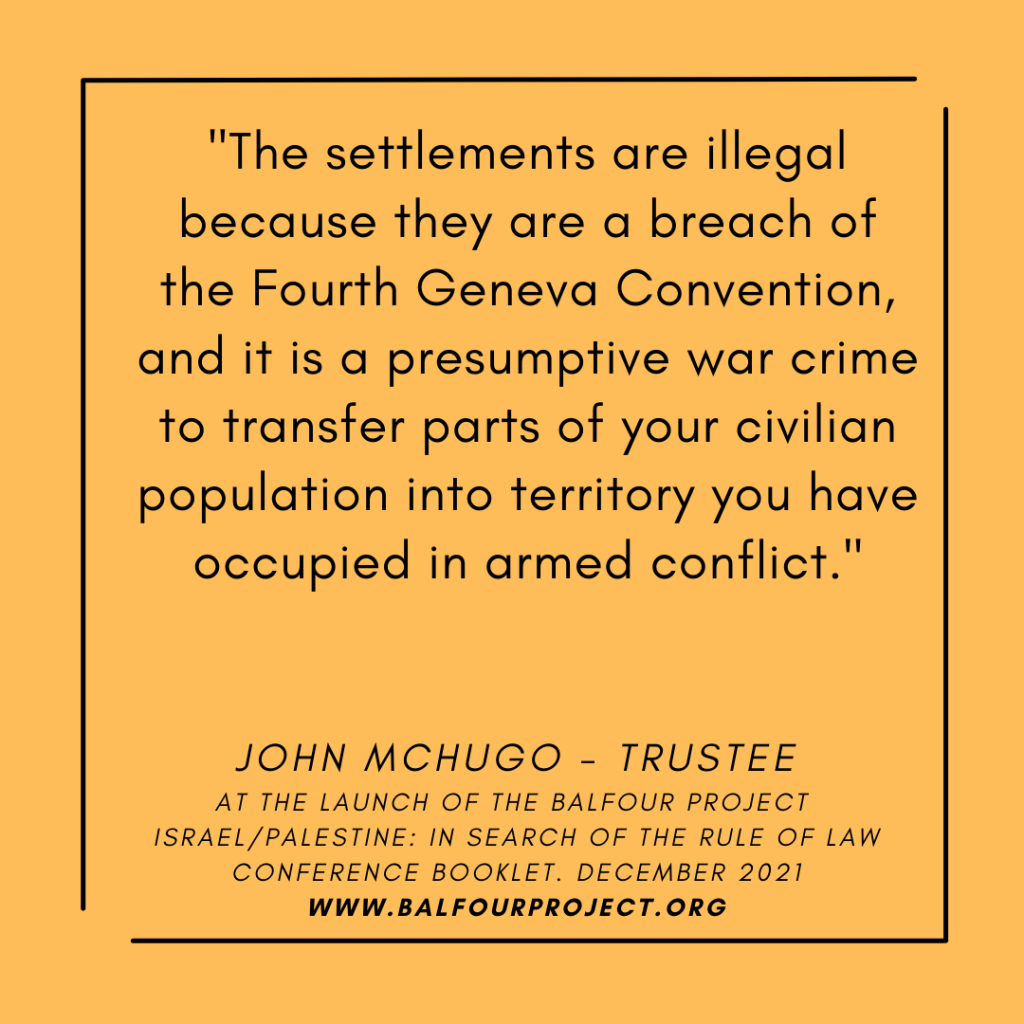
Take for instance, the question of the status of the territories that were occupied by Israel in 1967. Israel is not able to annex those territories by any unilateral act as far as international law is concerned. That is crystal clear. It is also crystal clear that the people of the Occupied Palestinian Territory have the right to self-determination. And that includes, of course, the option to set up their own state on that land if they wish to do so – and they do wish to do so. And it also means the territorial integrity of that land. As I said, no unilateral action by Israel can annex it.
And that means, as has already been pointed out, that the settlements are illegal because they are a breach of the Fourth Geneva Convention, and it is a presumptive war crime to transfer parts of your civilian population into territory you have occupied in armed conflict.
Well, I’ll pause there and let’s start looking at some of the questions that have come in from you. Dominic, Hagit and Nada, please feel free to comment on any of them. But I’ll begin with this one from Ronald Mendel: “how would you respond to Israel’s justifications for not recognising its obligation under international law? I’m thinking of statements like the occupied territories are disputed and the settlements are only built for security reasons”. Hagit, as settlements are mentioned specifically, perhaps would you like to say something about that? What about the self-defence argument?
Hagit:
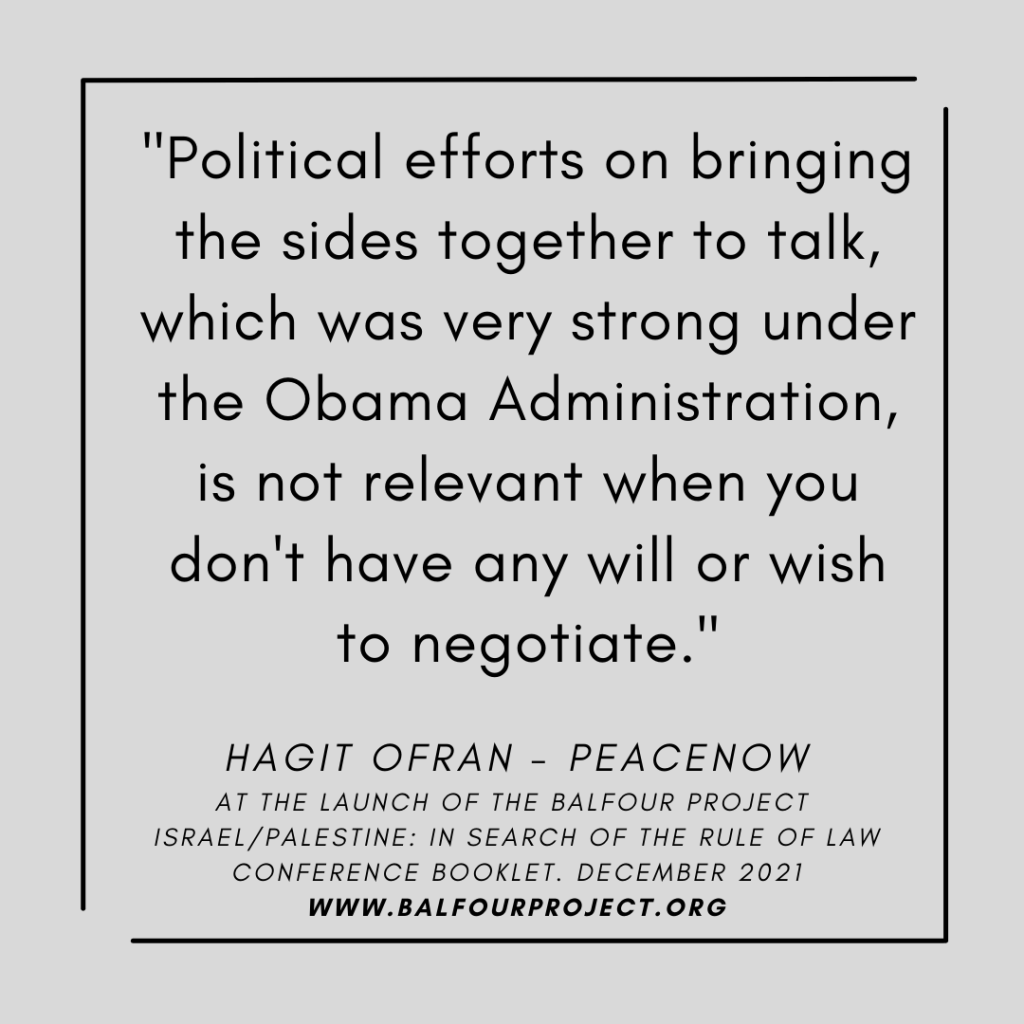
I think Israel, like every country, has the right to defend itself, but the right of self-defence has nothing to do with the right to control millions of people under occupation. I think it’s an illusion that it is contributing to our security. The threats for Israel for many years have not been the territorial threats. We have rockets that can hit us from very far, so we don’t need more territory in order to protect ourselves. And the settlements themselves are definitely not security assets, but a burden that our military needs to defend, as well as all the roads that lead to them. And scattered all around the West Bank, the Israeli army has a lot of work to do only to make sure that the civilians are not hurt there. So, this excuse is just an excuse, and it cannot be accepted.
John:
Dominic or Nada would you like to add anything?
Dominic:
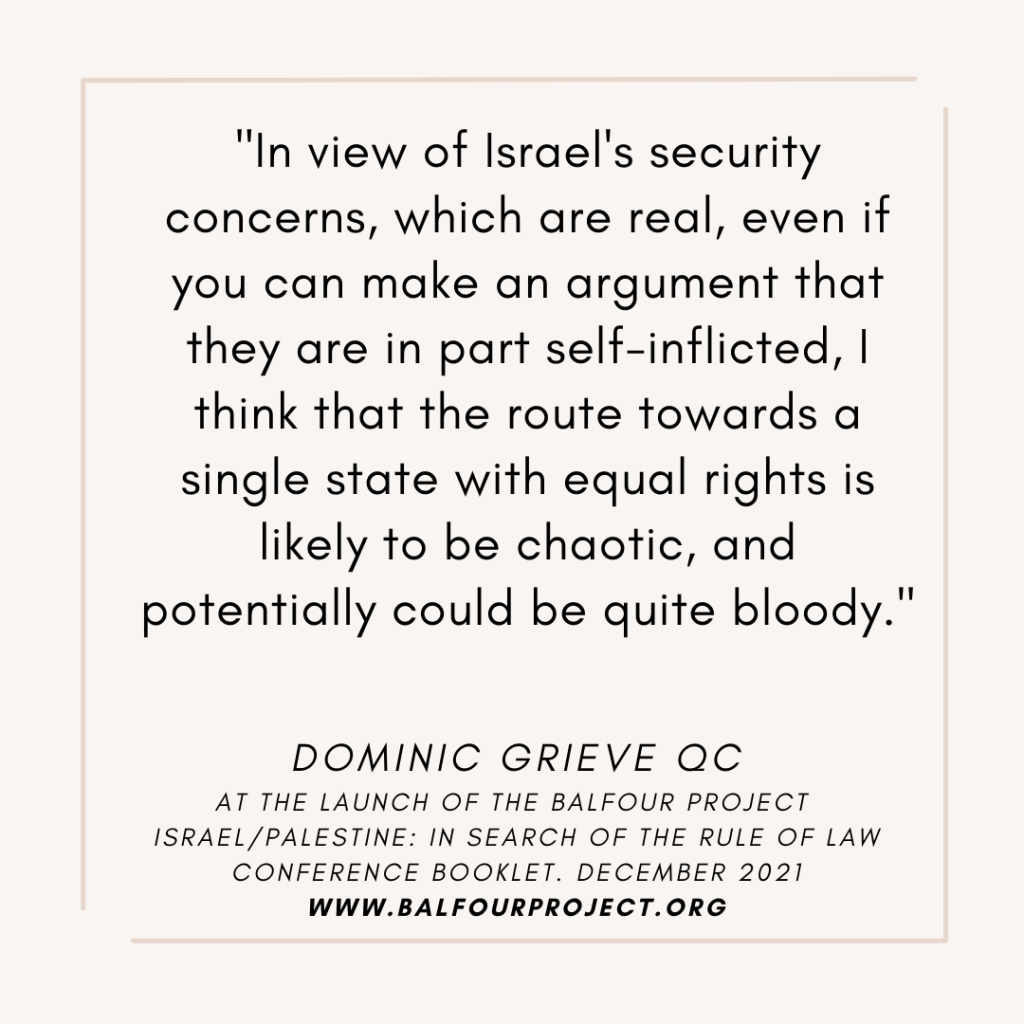
I’m happy to add this, that Israel’s position on this is really untenable. Firstly, it has supported the principle of a two-state solution. And the cumulative impact of what it is doing in the West Bank is to make a two-state solution impossible, because you cannot create a state which is carved up by islands of settlements which make it impossible to create a cohesive, and economically and politically viable, unit.
There may be an argument that the cease-fire line, when it was fixed in 1949, was not considered necessarily to be immutable. But on the other hand, Israel accepted the existence of that cease-fire line. And the cease-fire line is there as part of the UN’s attempts at reaching a solution. So, I don’t find that a viable argument. It’s clearly doesn’t have any traction in international law at all.
Is Israel creating an apartheid state? Well, yes, it is. Whether it is in an apartheid state now is, I think in a funny way, neither here and nor there. The impact of what it’s doing, and its necessary outcome is going to create a single political unit under Israeli domination with people having vastly different rights. It’s not the only place on earth to do it. We can see the Chinese doing it in central Asia to some of their own citizens, but it is unusual. And I think this is the point that we always have to keep in mind.
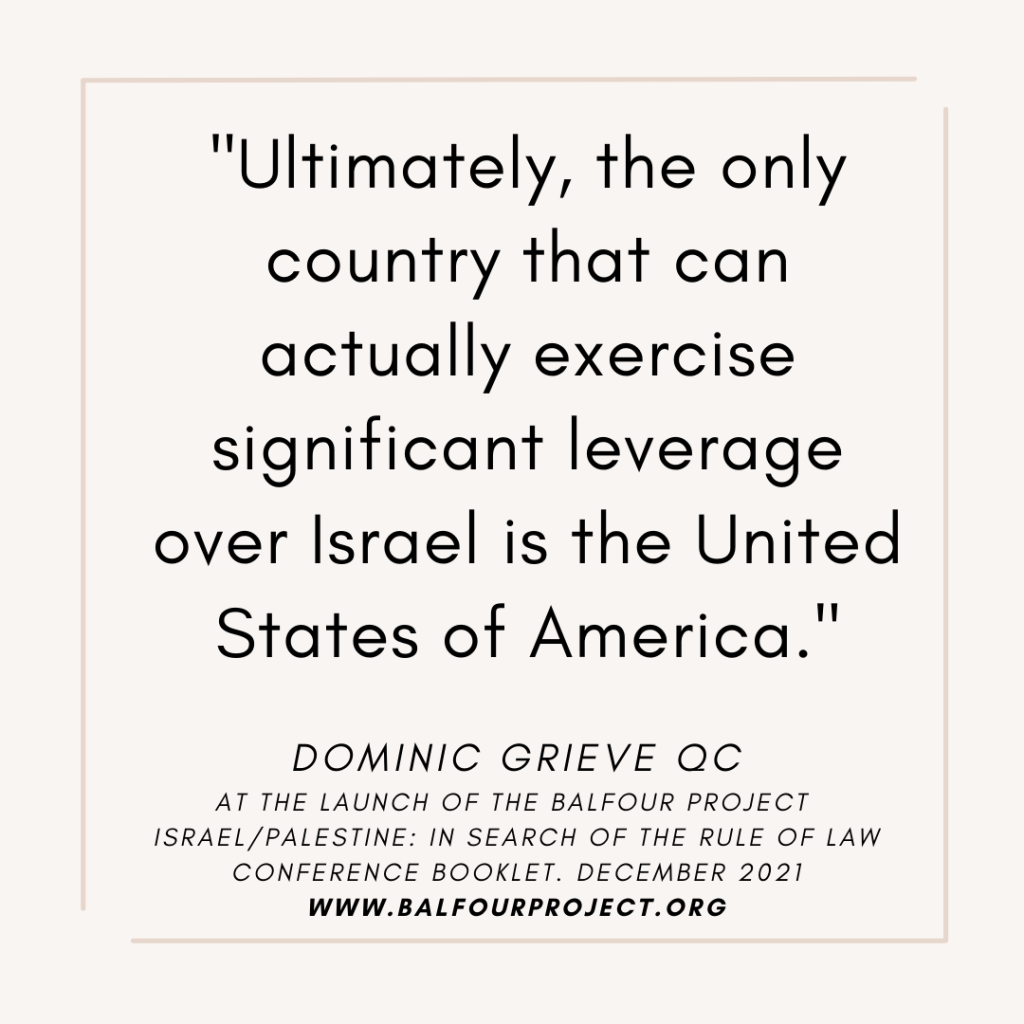
Israel says it’s a rule of law state and indeed it has many the trappings of a rule of law state. And we should see that as an advantage for our argument. It does have a Supreme Court and an independent judiciary and yet despite those things, it is behaving in ways the international community sees as being profoundly unsatisfactory. But we should also recognise it does give us an opportunity for a dialogue with the Israelis that perhaps we don’t have with some tyrannies.
John:
Thank you. Nada, would you like to add anything to that?
Nada:
Yes. I would. Just a brief comment. In that question, there’s a presumption or an acknowledgement that settlements are being constructed for security reasons. That’s no longer the case, if Israel ever did argue that it is no longer part of the general discourse or the justification that’s used for settlements today.
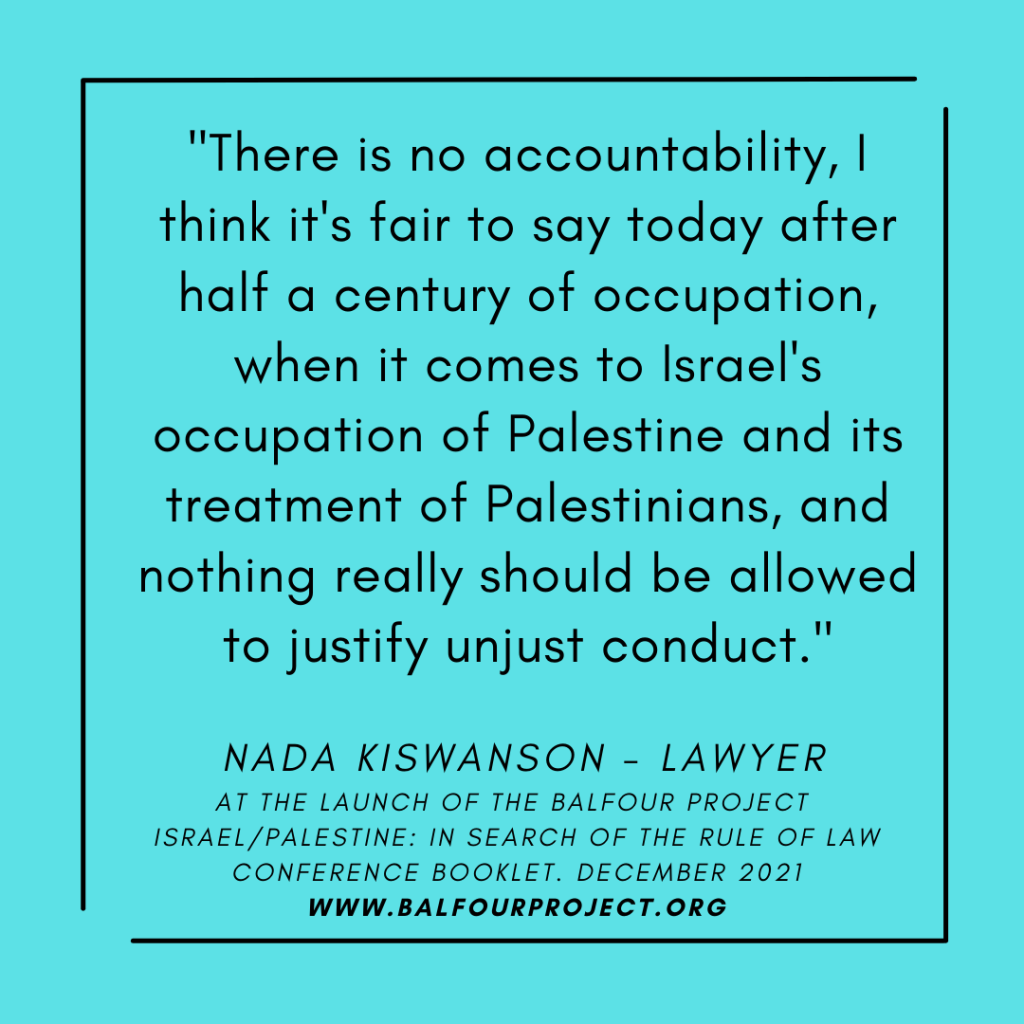
Today, what we’re having is hundreds and thousands of dunams of Palestinian lands being taken unlawfully for the construction of civilian settlements and for the use of ‘normal’ citizens of Israel. And very much the idea that underlies that is a historic land of Israel that goes far and deep into the West Bank, and actually includes the entire West Bank. So, this is not about security. Even Israel has stopped using that argument. If we’re looking at statements from politicians, they are no longer shy about it. They say that the West Bank is theirs and they want to settle in it. And that’s the reason for why they’re there. It’s an ideologically motivated project.
John:
There’ve been quite a few questions focused on BDS and British government policy and what can be done about it. Fahad Abu Atta has asked a couple of questions. Why should Israel change its policy if the UK and USA continue to support Israel with no questions asked? There’ve been many other questions and statements that are variants of this one. He also asks: will the Palestinian leadership and people forget about a Palestinian state and begin to ask for equal recognition with Israelis? These questions should be taken a bit separately, the role of the British government and boycott, divestment and sanctions. Dominic, do you think there’s any realistic chance of British government policy moving in those directions?
I noticed that the Liberal Democrat Party Conference (and I know they are by far the smallest of the three parties represented from all over the UK in the House of Commons) said that there should be action concerning trade with settlements. And that’s very much the Balfour Project position. I think also the SNP and the Labour Party have moved in that direction, too. But can you see any sign of British government policy shifting on this issue?
Dominic:
I doubt at the moment that British government policy will shift. Britain has been consistent in one sense in denouncing the creation of settlements, in emphasising the need for a two-state solution, in refusing to recognise any Israeli legitimacy to occupy any part of the West Bank or Gaza, and indeed East Jerusalem. It has been consistent in refusing to move its embassy to Jerusalem as the Americans have done. But beyond that, successive UK governments have taken the view that it is a problem that Israel needs to resolve. They’re happy to use and offer their good offices, but they don’t believe that trying to pressurise the Israelis either unilaterally or when we were members of the EU, through the EU, is likely to be productive. Now, one can criticise that. You can certainly make a legitimate argument that accepting economic produce from the settlements is something that we shouldn’t be doing, and I can well understand why some have advocated that.
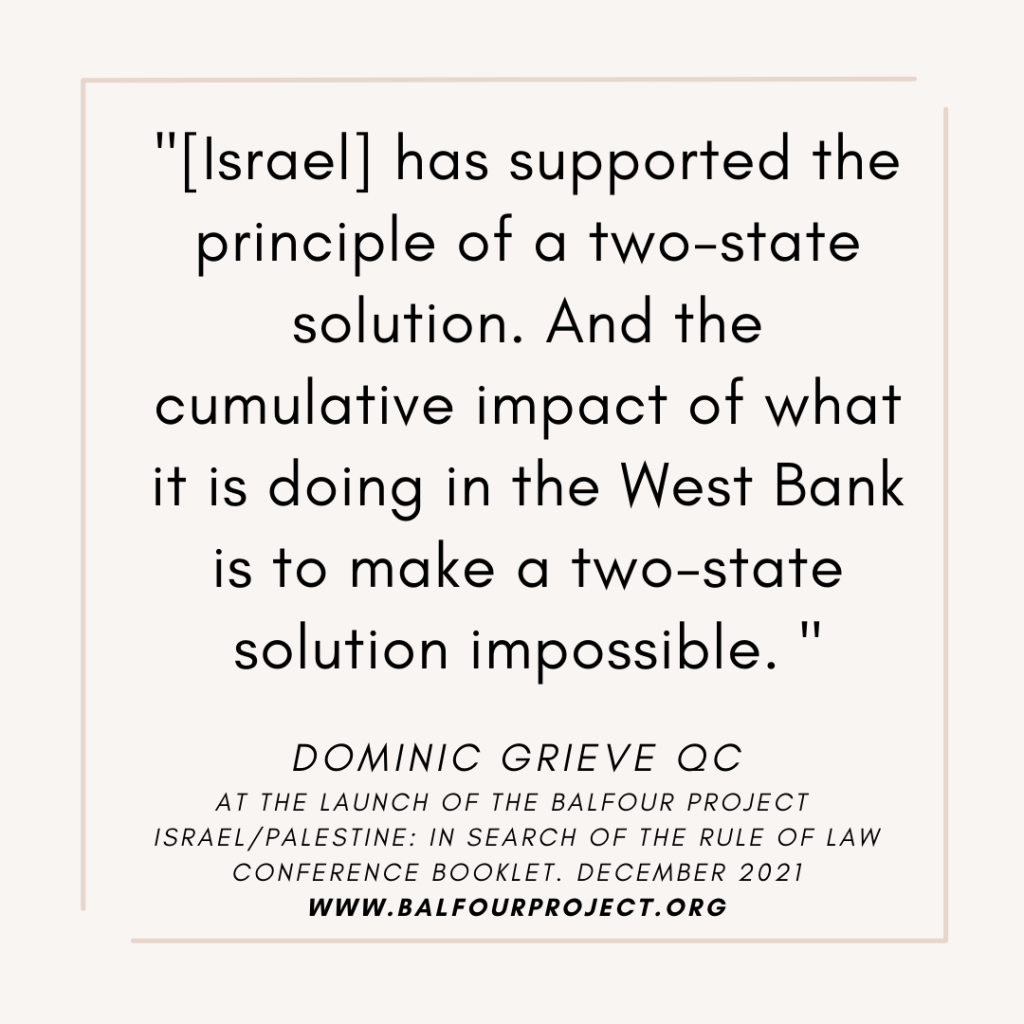
The UK government’s attitude has been that they don’t think it’s going to help. And it is true in my judgment that ultimately the only country that can actually exercise significant leverage over Israel is the United States of America. And so, if the United States itself is not willing to budge on this subject and is not willing to apply that pressure, it’s very unlikely that the United Kingdom on its own would be able to make any significant impact.
So that’s the best answer I can give you. It’s possible that a future Labour government might take a stronger view and certainly they would be fully justified in doing it if they wish to. There is, I think, all the justification in international law for doing it, but whether that actually is going to produce a benefit is a legitimate question. And as I say, in the absence of the US’s involvement, it’s difficult to see how it would necessarily have an impact.
John:
Indeed, as far as the international law position is concerned, the question of differentiation between Israel itself and the settlements in the occupied territory was mentioned in Security Council Resolution 2334, which America allowed to go through the Security Council in the dying days of the Obama Administration. There can be little doubt that that reflects what was already customary international law. Hagit or Nada, would you like to say anything?
Hagit:
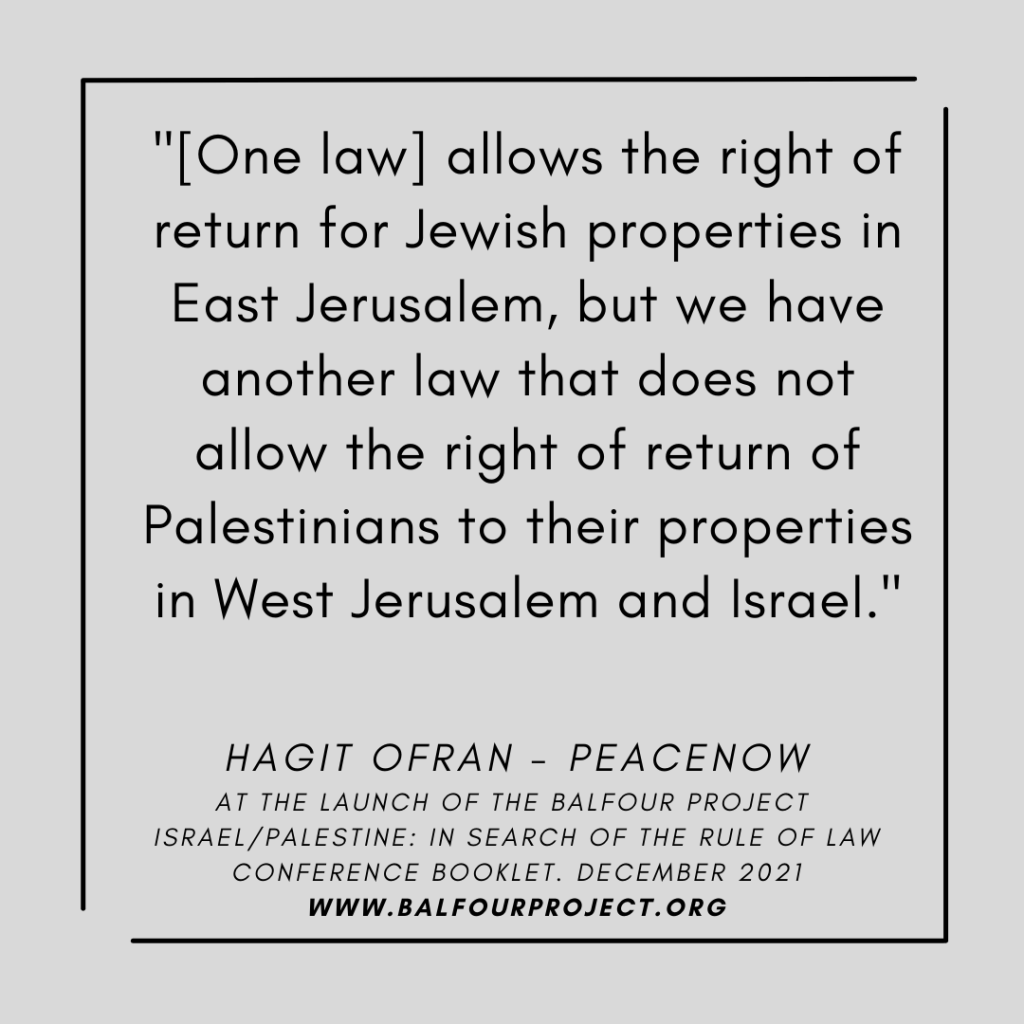
I would refer people to Nada’s talk at the conference. And the question of accountability is something very important. And of course, especially when we are so frustrated that we cannot make any change for so many years, we want to see something that means Israel will start to pay for this policy. But then there should be the question: what is the best way to make Israelis, or Israel pay? But for sure, I think that the world should be much clearer about opposing this policy. Differentiation should be something that is taken for granted, and not require a change to be made. Actually, we don’t need to change any law to say that the West Bank is not part of Israel, and that our agreements with Israel is not a plan about settlements.
John:
Indeed. We’ve got a question here from someone about the Israeli Supreme Court, Matthew Gothill, “what is the international standing of the Israeli Supreme Court, given that it appears to be unable or unwilling to uphold international law regarding the occupation?”
I was going to put that one to Hagit if I may, but I do recall that in the proceedings of the conference, Michael Sfard, your Israeli colleague, said that the Israeli Supreme Court has decided that the question of the settlements is a political one and therefore not justiciable, and the Court has therefore kept out of issues concerning the legality of the settlements or otherwise. Would you agree with that? Is there anything you would like to add?
Hagit:
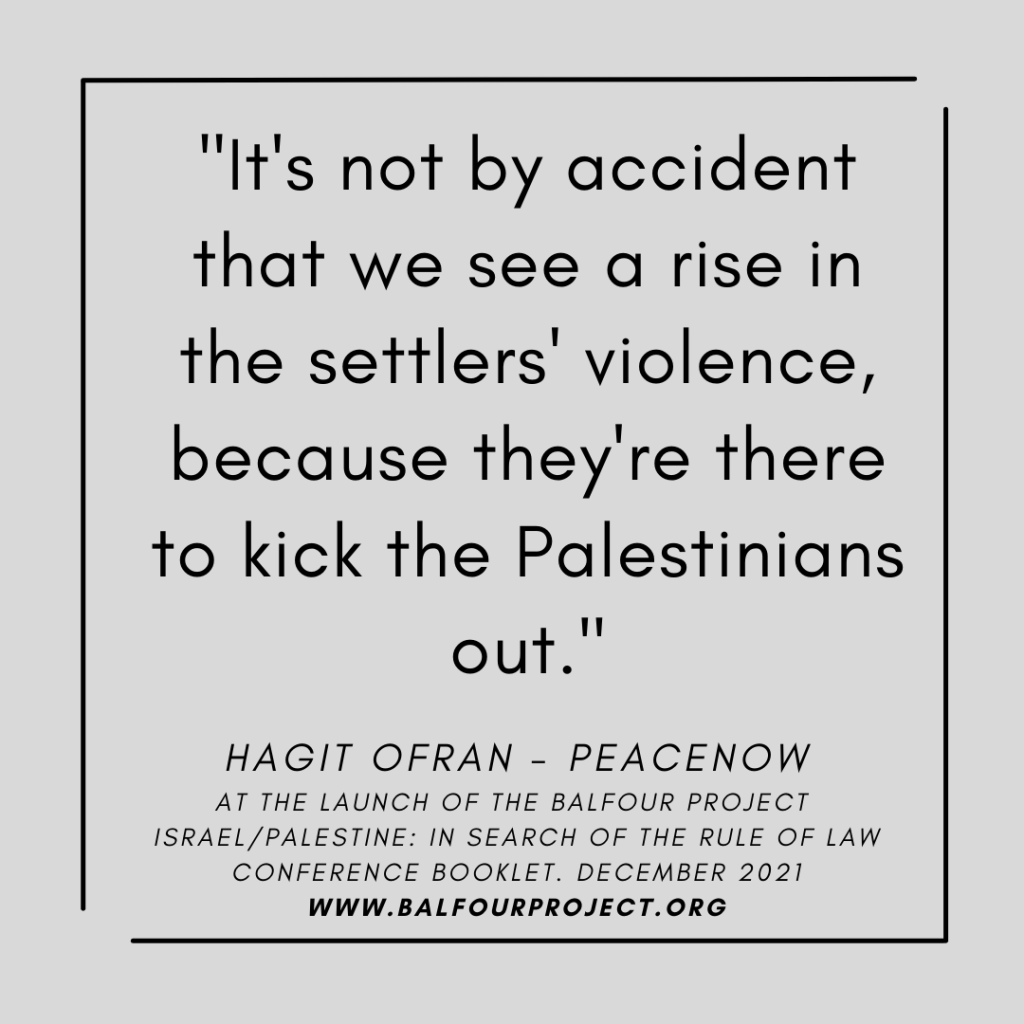
I wanted to say, and I keep reminding myself this, that the Supreme Court and the Court of Israel will not end the occupation, unfortunately for us. But it’s really not something they can really do. I’m not justifying them for allowing the occupation. I’m just saying that it’s really a political matter, but that I would expect them to limit the Israeli policies much more, but it won’t happen. I mean, the court will not end the occupation. We need to make the politicians stop it.
John:
Of course, in this country, not so very long ago, we had a case before the Supreme Court, when the government tried to prorogue Parliament and the Supreme court, which had been very reluctant to be involved in politics, found itself forced to do so. I’m sure unwillingly, but nevertheless, when it had to, it took the chance, and it did give a clear and decisive and very well-reasoned ruling. You don’t see any possibility of something like that happening in the case of the Israeli occupation?
Hagit:
Not as regards the occupation in itself. For instance, we went to court on settlements that were built on private Palestinian land. And the court was very clear that you cannot build on private Palestinian land, but all the other settlements remained. And there were even a few settlements that were evicted after rulings of the Supreme Court. And the Supreme Court in Israel was attacked strongly by the right-wing and by the politicians that undermined it dramatically in recent years. Israel will come up with new legal ideas of how to say that this crime is legal. And again, I’m not saying “quit the legal approach”, I’m just saying that, as an Israeli, I cannot expect the Supreme Court to end such a dramatic 54-year policy of all governments of Israel. It’s just impossible to imagine.
John:
Nada, do you want to add anything?
Nada:
Well, yes, absolutely. I agree. I think when we speak about domestic mechanisms, including the Israeli Supreme Court, what we have to remember is that the Israeli Supreme Court is part of the state of Israel. It does not operate in a vacuum. And I think it would be very naive to believe that it is wholly detached from what is happening in Israel and what is coming out of the executive branch. What we can see throughout the decades of the occupation and countless petitions that have been filed before the Supreme Court is that the Supreme Court is extremely reluctant to intervene and actually address and correct Israeli actions that we would otherwise consider to be quite straightforward in their illegality.
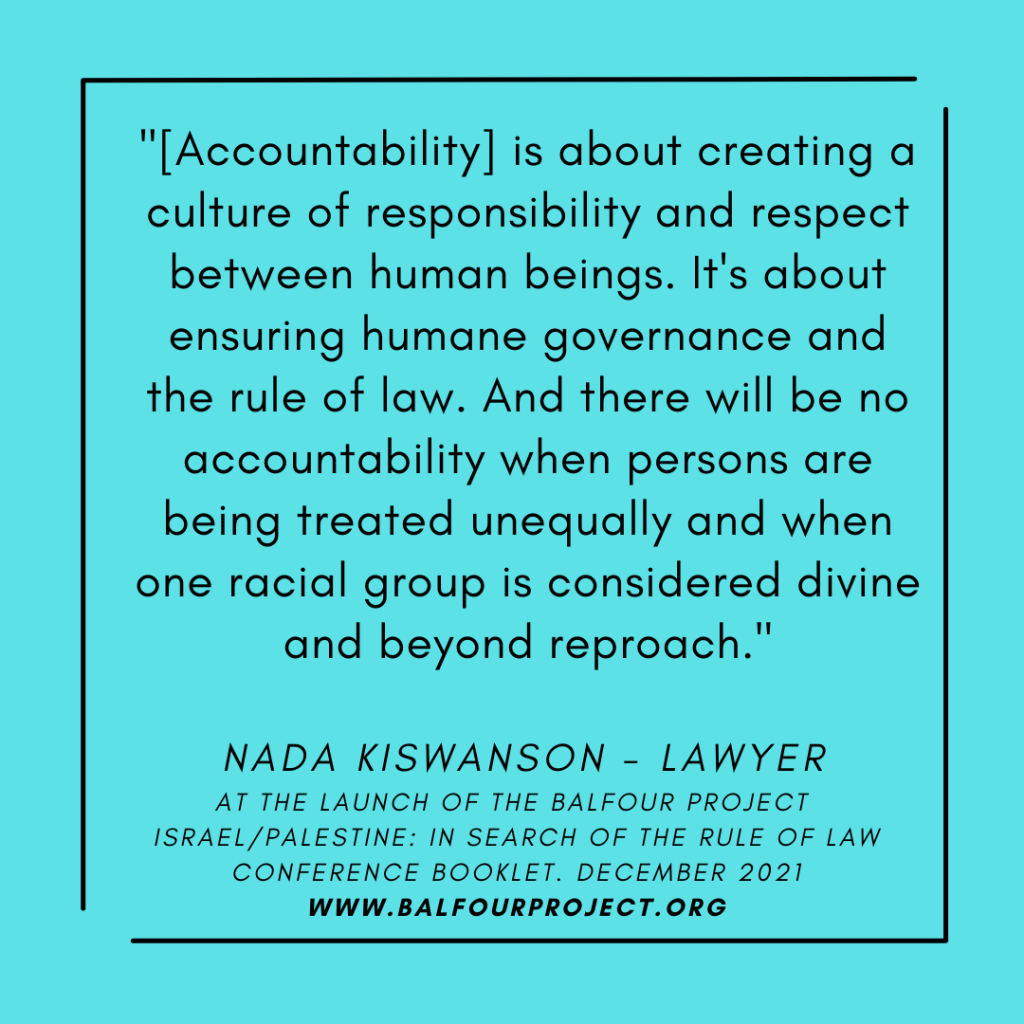
When they violate the prohibition against settlement transfer or the transfer of the protected Palestinian population, home demolitions, the presence of the annexation wall in occupied territory, the Supreme Court has not been willing to actually check Israel. And so, Israel has been left to do as it pleases. And so, it would be odd, to say the least, for the Supreme Court to come out after 54 years of setting a very strong jurisprudence as to not correcting Israel to suddenly say everything that you’ve been doing for 54 years is wrong. And we were wrong in all of our decisions over those years. That just simply won’t be the case.
John:
I’ve got a question here from a member of parliament, Mr. Andy Slaughter. And I think it’s primarily addressed to you, Dominic. I’ll read it out. “How can we get more politicians from the right and centre-right to engage on this issue? These should not be partisan issues, but whereas left of centre, nationalist and green parties are engaged, as they are in many other European countries, it is difficult to find allies on the right. Now, I can think of other members of the Conservative Party, such as David Jones, who have very, very good approaches to this issue, but could you give us any thoughts on that?
Dominic:
I think there are actually a lot of Conservative MPs who are deeply concerned about what’s happening in the West Bank and Gaza, are quite critical of the current government’s inertia on the subject and, indeed, the inertia of previous governments – in fairness to the current government. Whatever other criticisms I may have, it is simply continuing a policy of the previous Conservative government throughout David Cameron’s period when he was prime minister. This policy was that the security considerations and the importance of our partnership with Israel in the wider Middle East, and the fact that Israel was a friendly country towards us, militated effectively against doing more than we were doing in marking our disapproval of what was happening in the West Bank, but effectively doing nothing much about it. But there are such MPs on the Conservative benches and some of them are still there, but because this seems to have become a very settled policy view within the Conservative Party over the last 30 years, or perhaps even longer, there’s a feeling that that’s it.
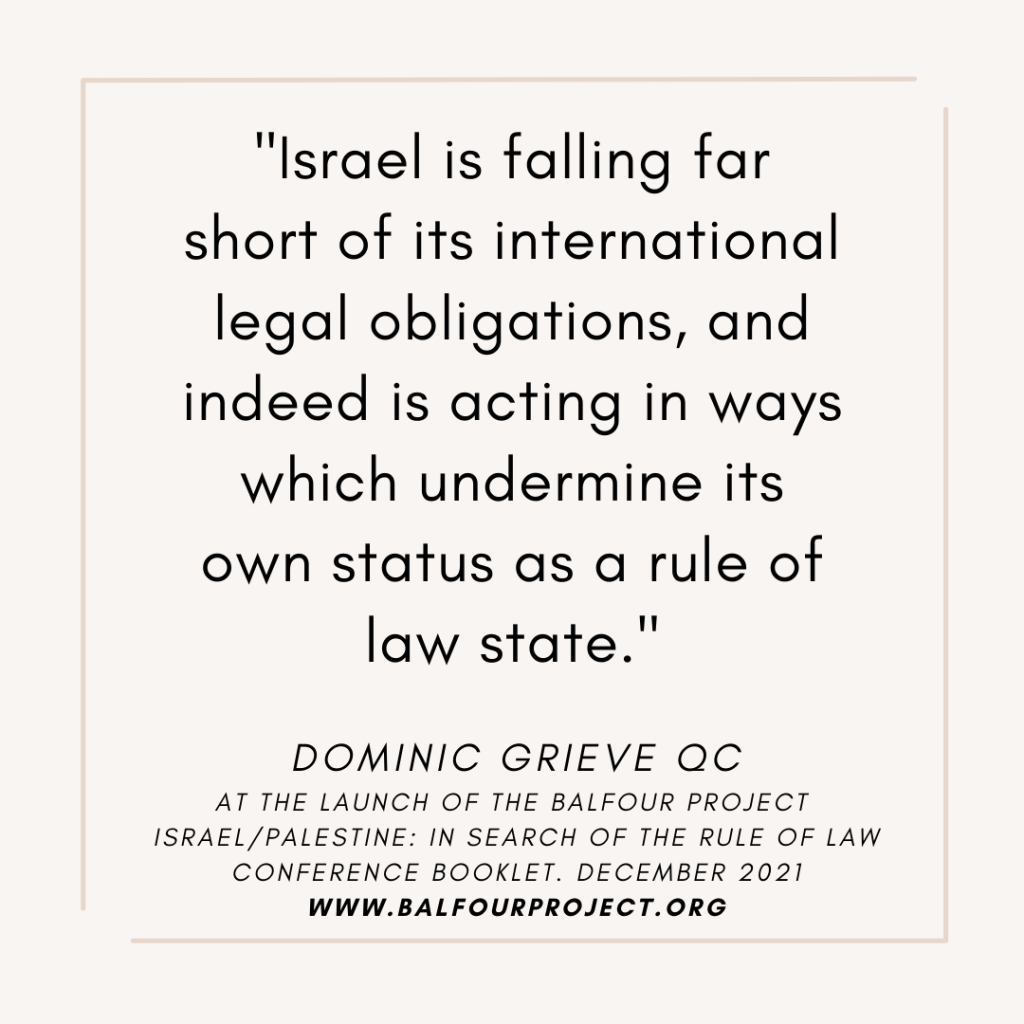
They may personally have some contact with the Balfour Project indeed, and with other organisations that express their concern. And they’re quite well networked into the wider Middle East in wanting to try and find a moderate, peaceful solution to this conflict and the current situation, they’re sort of rather stymied from taking things any further. It would need, I think the change in leadership view about this and that doesn’t necessarily mean a change from the prime minister, just a change in leadership view to bring about a shift. The Labour Party has, I know, had perhaps clearer debates about this, but when it’s come to the crunch and the Labour government’s been in office, it has tended to act in exactly the same way.
John:
I think that’s true. I mean, it’s very interesting to see the different remarks by Boris Johnson. I think when he was foreign secretary, he said that you either have a two-state solution or you’ll end up with some kind of apartheid. And more recently he wrote a letter to the Conservative Friends of Israel in which he talked about how Britain did not think the ICC should be involved in cases concerning what is happening in the occupied Palestinian territory. I think there is a very strong contrast there.
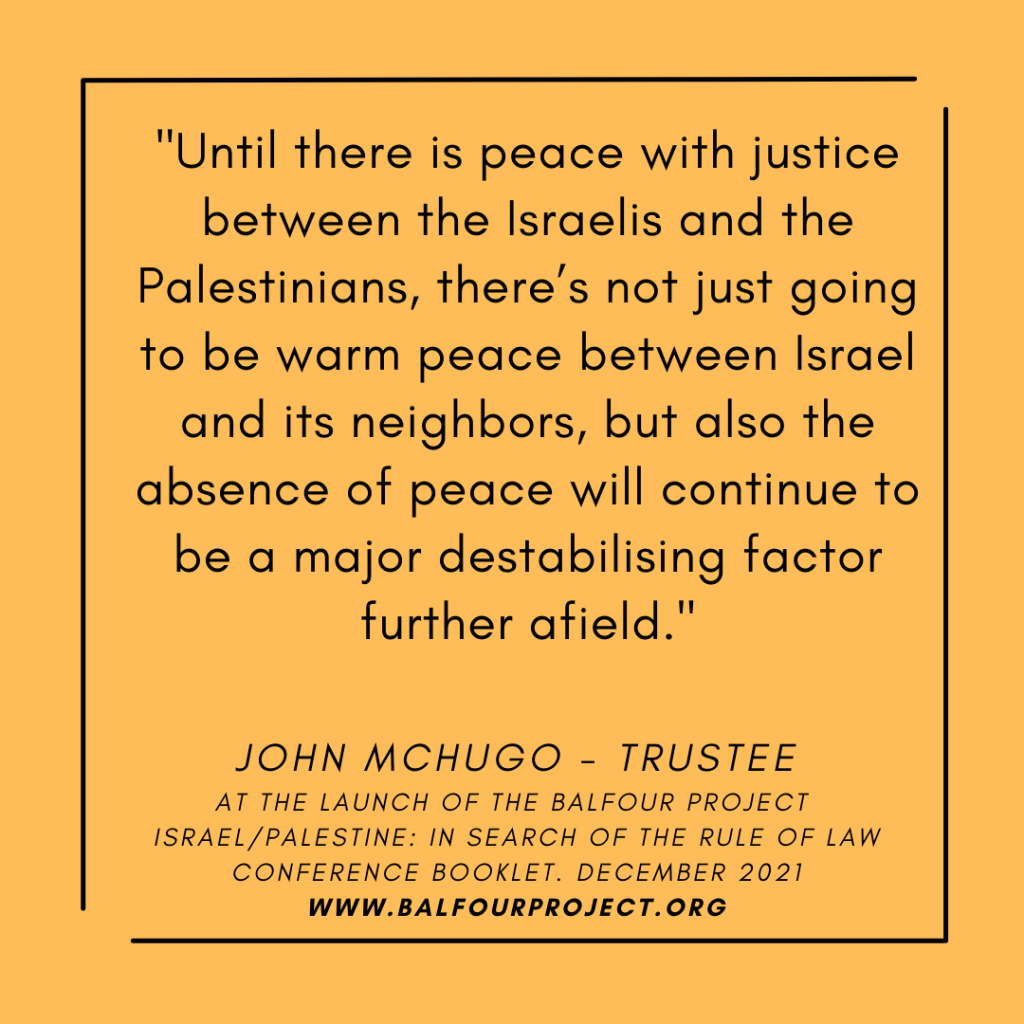
And I suppose this brings us naturally to the whole two-state/one-state issue. The legal rights that the Balfour Project talks about are the legal rights that are set out in this brochure which explains the rights of both parties. For instance, Israel is a sovereign state and a member of the UN. It is equally clear that the Palestinians have the right of self-determination, and that means they have the right to their land, and they have the right to take jurisdiction over it through the establishment of their own state, and that includes over all the settlements that have been built.
It is necessary for us to achieve the two-state solution and then see what happens, because if the two parties were to agree to form a single state, they would be free to do so. But my understanding has always been that neither Israelis nor Palestinians really want that. Now there have been a number of questions in the chat box about the two-state solution rather than the one-state solution. But personally, I don’t see how we can do anything other than press for legal rights which have been outlined. And also, for the basic concept of equality of treatment for all people. Would any of you like to comment on that?
Hagit:
Realistically, I don’t see a possibility that the Israelis or the Israeli Jews will agree to a one-state where we have equal number of Palestinians or even a majority of Palestinians and equal rights. Unfortunately, it’s much more realistic to believe that if Israel is forced to end the occupation, Israel will opt to withdraw from the West Bank and allow a Palestinian state, that’s in terms of tactics. But I totally understand the people who are so frustrated about the two-state solution and bring this argument about the one state solution.
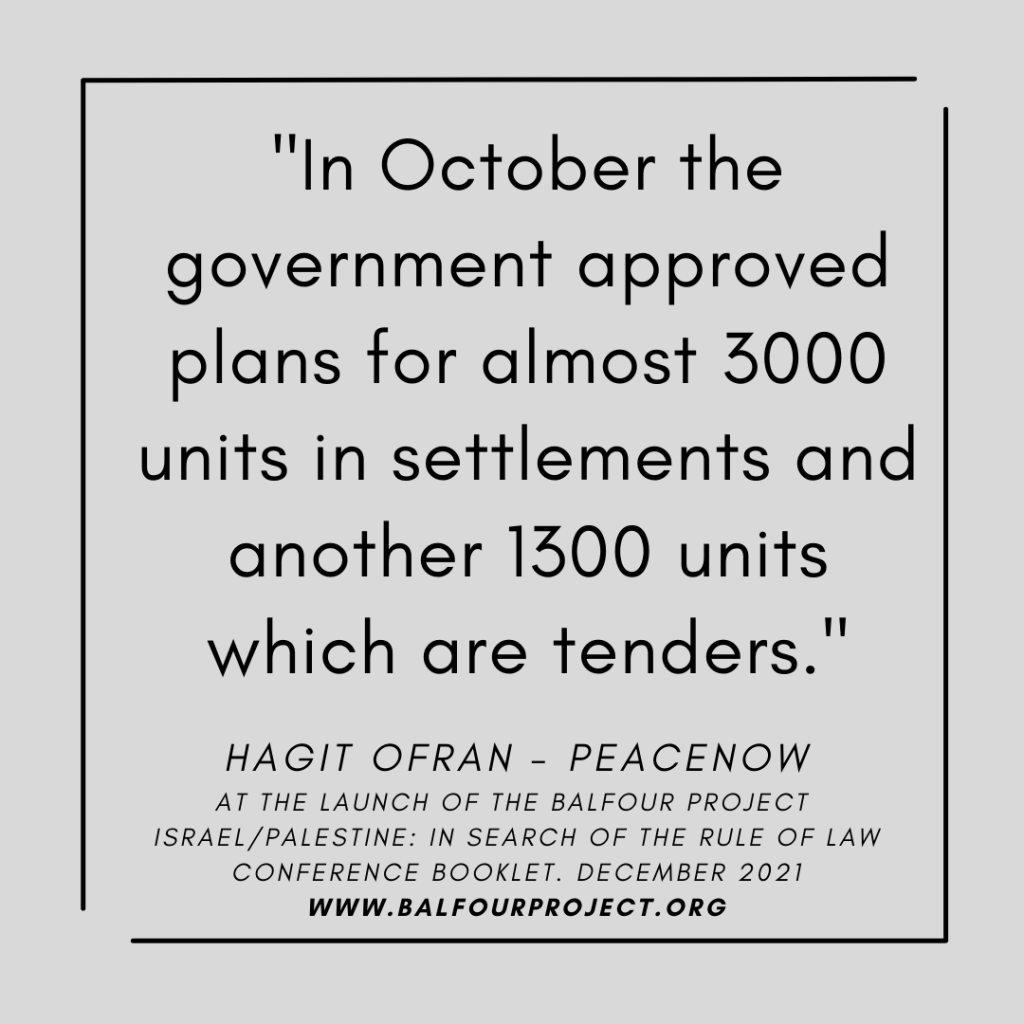
It’s not going to happen, I think this argument is very problematic because if you are saying, well, one-state is where we should go to, then the fight against occupation becomes a little harder, especially in terms of the settlements.
Because if Israel is going to be finished and there is no withdrawal as part of the end game, then why should we not have another settlement here, another settlement there? People will say, “let them stay”.
It’s also giving up, or giving in to the settlers, and saying to them, “we cannot undo you”. It’s giving them legitimation. And I truly believe that the majority of Israelis are so indifferent. On the one hand, they have allowed everything to happen for 54 years now. But as soon as there is leadership to say, “we’re withdrawing”, the majority of Israelis will agree and will all say, “I was always against occupation”.
Dominic:
My personal view is that one can understand the temptation of arguing, well, the two-state solution has failed, therefore we should look at ending the apartheid nature of the current occupation of the entire land mass of Palestine. But it raises very much the problems that Hagit has raised, and how that would actually work out in the medium to long term, I simply don’t know.
In view of Israel’s security concerns, which are real, even if you can make an argument that they are in part self-inflicted, I think that the route towards a single state with equal rights is likely to be chaotic, and potentially could be quite bloody. And I’m not sure that it’s a viable solution. Maybe the de facto outcome of current Israeli policy. My own view is that as there has been an acceptance of the possibility of a two-state solution. It is that which should be promoted.
And if there is one thing I could push, and it was pushed in the conference., it is the following. I would, without doubt if I had an opportunity in government, which unfortunately I don’t, I would recognise Palestine as a state and as a territory, whatever the final settlement might be on the basis of adjustments of borders that might take place. I think that’s the most compelling argument that we should be making in future accompanied by a continued reiteration that Israel has an obligation to respect international law and that it is clearly violating it. And that is actually a political issue. And coming back to the point about the Supreme Court of Israel, there are limits to which domestic Supreme Courts can enforce international law. So, I think we just have to recognise that that’s a political issue, but that’s the shift I think we should be making.
Whether at some later stage, it should be accompanied by boycotting settlement produce, that would also be in my view legitimate. But I think that that is the better route forward than suddenly completely reversing years of policy and saying, right, we will take you at your word, you’re a single state, but you are not treating your own citizens correctly because that’s never been Israel’s position. If Israel were annexing the entire West Bank and saying it was forming part of Israel, then that might be an argument that could be powerfully made. I think in the absence of it, I would stick to the way international law has tried to treat this conflict.
John:
Thank you. Nada, would you like to add anything?
Nada:
I don’t adopt a one-state or two-state solution lens to the occupation. But what I do think` is important is that we recognise that Palestinians have a right to self-determination. And as part of that right, it should be up to Palestinians to determine how they would like to live and whether or not they would like to live as part of one-state or two-states.
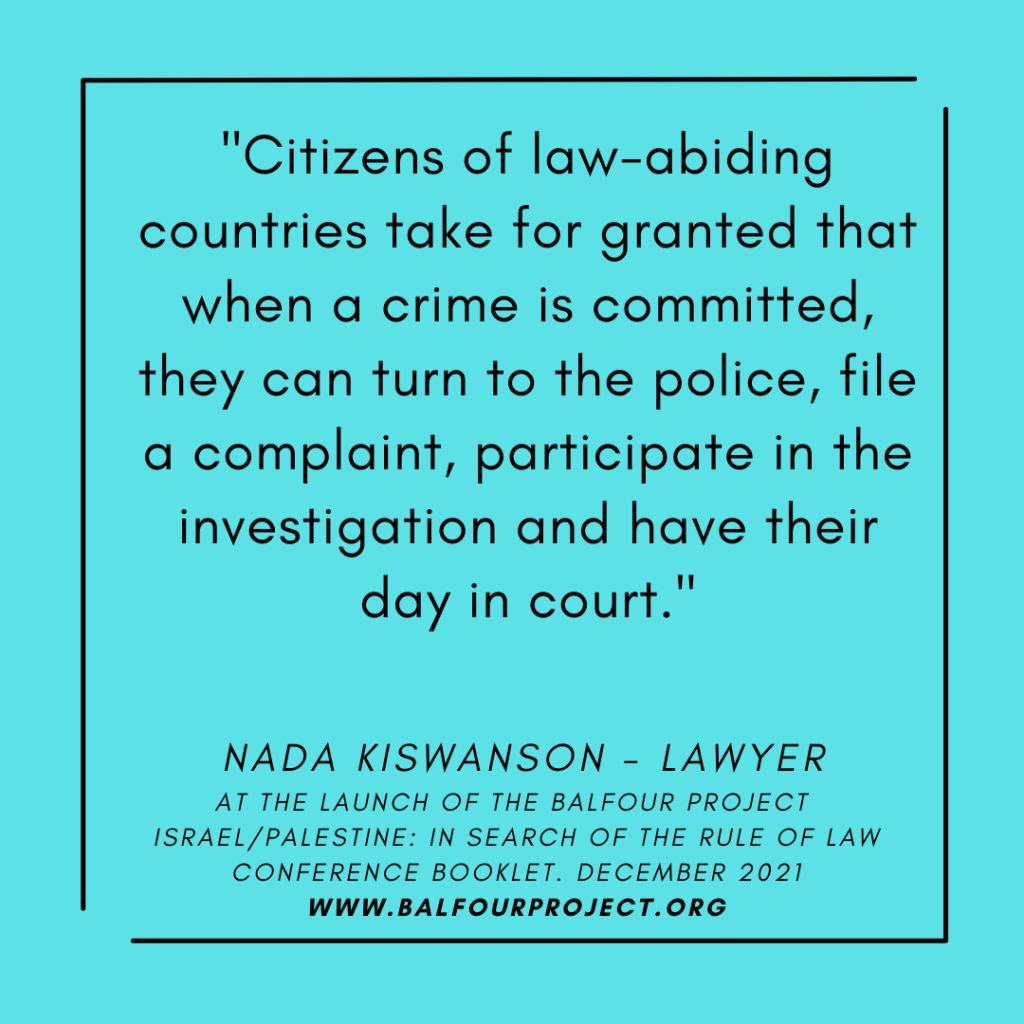
Now, obviously one would never expect anyone to make any decision of such consequence while living under coercion, while living under suppression and occupation. I think what Hagit said in the beginning about focusing the conversation around de-occupation is essential. We need to first end the occupation and then have a conversation as to what does the future look like? And Palestinians need to be in the driver’s seat. These decisions should not be made by Britain, by the US or by Israel. It is part and parcel of their right to self-determination and that’s really where the focus should be.
John:
Thank you very much. We’re now out of time, I’m afraid. So, I’d like to thank our panelists. Before I do so I think that I should just mention one thing that’s cropped up in the chat box. This is from Omar Shamma. If you remember, I said that both Israelis and Palestinians want their own state separate from the other. And he has said, “I am a Palestinian and I, and MANY other Palestinians support a ONE STATE Well, that I think brings us to the end.
So, I’d like to thank our three participants. They might say a few closing words.
Nada:
to thank you again for inviting me to the conference, but also today for the launch of the booklet. And I wish you all the best in your future endeavors with the Balfour Project.
Hagit:
I also want to thank you and ask all of you not to give up on us. Things are frustrating, but the occupation can end, and it’ll end, and we need all of you to help us end it.
Dominic:
My thanks to the Balfour Project for having involved me in it, for the conference and for this excellent booklet that has been produced. My thanks to Nada and to Hagit for their participation this afternoon and to you, John, for all you’ve done with this and to the many people who’ve joined us this afternoon.
And perhaps just to pick up at that one point by Omar, I’m a Palestinian and many other Palestinians support a one-state solution. I would just like to emphasise the point I think that this project is about. It is recognising that the Palestinians living in Palestine have the right to self-determination and sovereignty. How that is subsequently exercised is another matter and is for those in the West Bank and Gaza. But I think that the point about it is that it is rooted in principles of law.
You won’t be surprised that many of us who have looked into it are lawyers. And because Israel for all its faults is a country which says it subscribes to the rule of law, and indeed in some respects does so, but not unfortunately all when it comes to its international legal obligations, I think there’s a view amongst us that the law is actually quite a powerful tool for getting peaceful change. And that’s what the Balfour Project is dedicated to doing. And that’s why I’m very grateful to it and to Vincent who set it up for doing it in this fashion. And for all those of you who are lending your support to it at the moment. And if we can do some positive good as a consequence, then we are working in the right direction. Thank you all very much for joining us this afternoon.
